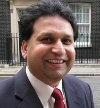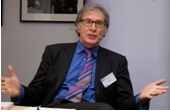The British Politics and Policy at LSE blog draws upon experts from the LSE and beyond – please click each link below to go to the expert’s profile.
If you would like to contribute to British Politics and Policy @ LSE, please read our notes for authors and potential authors.
Contributors by surname
______________________________________________________________________
A-C
 Paul Adamson – Founder, E!Sharp
Paul Adamson – Founder, E!Sharp
Paul Adamson is chairman of the Centre, Brussels’ first think-do tank, which he co-founded in 2003. He is also founder and publisher of E!Sharp, a bi-monthly magazine on European Union affairs launched in 2001. Mr. Adamson moved to Brussels in the early 1980s after studying at the European University Institute in Florence, where he was the first U.K. student. After a brief stint in the European Parliament, he embarked on a career in EU public affairs, where he is widely seen as a pioneer. He is a trustee of the Institute for Citizenship and advises a number of organisations on a pro bono basis.
Read articles by Paul Adamson.
 Dr Gabriel Ahlfeldt – LSE Department of Geography and Environment
Dr Gabriel Ahlfeldt – LSE Department of Geography and Environment
Dr. Gabriel Ahlfeldt joined the Department of Geography and Environment in October 2009 as a Lecturer in Urban Economics and Land Development. Dr. Ahlfeldt is an Affiliate of the Spatial Economics Research Centre (SERC) and an associate of the Centre for Metropolitan Studies, Berlin. His research concentrates on the effect of large transport projects and architectural developments on local house prices, local political preferences and urban structure.
Read articles by Dr Gabriel Ahlfeldt.
 Graham Allen MP – Member of Parliament for Nottingham North
Graham Allen MP – Member of Parliament for Nottingham North
Graham became a Member of Parliament for Nottingham North in 1987. He served as a spokesperson in six front bench briefs in opposition. He wrote The Last Prime Minister: Being Honest About the UK Presidency as well as co-authoring a book on early intervention, entitled, Early Intervention: Good Parents, Great Kids, Better Citizens with Iain Duncan-Smith. He is also Chair of the Political and Constitutional Reform Select Committee which scrutinises the remit of the Deputy Prime Minister, Nick Clegg.
Read articles by Graham Allen MP.
 Rebecca Allen – Institute of Education
Rebecca Allen – Institute of Education
Rebecca Allen is a Senior Lecturer in the Economics of Education at the Institute of Education, University of London. Rebecca is interested in secondary schools as institutions and the effect of government policies on their behaviour and performance. Areas of research interest include school admissions policies and parental choice of school; school accountability and governance; the role of faith schools in state education; competition between schools. She specialises in quantitative evaluation methods, with a particular interest in the measurement of segregation and estimating school effectiveness
Read articles by Rebecca Allen
 Claire Annesley – Manchester University
Claire Annesley – Manchester University
Claire Annesley is Senior Lecturer in Politics at the University of Manchester. Claire is a member of the European Commission’s network of experts in the fields of gender equality, social inclusion, health and long-term care (EGGSI) and is on the Management Committee of the UK Women’s Budget Group. Claire was awarded the 2011 Richard Rose Prize by the Political Studies Association for her distinctive contribution to the study of British Politics.
Read articles by Claire Annesley.
 Nick Anstead – Department of Media and Communications
Nick Anstead – Department of Media and Communications
Dr Nick Anstead is Lecturer in the Department of Media and Communication at the London School of Economics, where his research focuses on parties and elections, new modes of political communication and e-politics. He previously worked as Lecturer in Politics at the University of East Anglia.
Read articles by Nick Anstead.
Dr Robin Archer – LSE Department of Sociology
Dr Robin Archer is the director of the postgraduate programme in Political Sociology at the London School of Economics. Robin completed his doctoral work at Oxford University, where subsequently he became a Fellow in Politics at Corpus Christi College before moving to the LSE. His most recent book is Why Is There No Labor Party in the United States? (Princeton University Press 2010).
Read articles by Robin Archer.
Jonathan Ashworth – Morgan Stanley
Jonathan Ashworth is a UK Economist at Morgan Stanley. Previously, he has worked as a Global Macroeconomic Strategist/Economist at Barclays Wealth and an Economist at both Gerrard Investment Management and Her Majesty’s Treasury. He has a Master’s degree in Economics from Duke University and a 1st Class Honours Degree in Economics from Hull University.
Read articles by Jonathan Ashworth.
 Hero Austin – LSE Students’ Union
Hero Austin – LSE Students’ Union
Hero is currently on sabbatical from her Philosophy degree as the Community and Welfare Officer for LSE Students’ Union. Hero has been involved with a variety of campaigns since she became politically active at the oustset of the Iraq war. She teaches in schools in London & Nepal, and she also sits on the Society and Citizenship Policy Committee for the National Union of Students. Her day to day work at the Union involves working on campaigns, widening participation, socially responsible investment, welfare for students and much more.
 Nima Khorrami Assl – Transnational Crisis Project
Nima Khorrami Assl – Transnational Crisis Project
Nima Khorrami Assl is a security analyst at Transnational Crisis Project in London where he monitors and writes policy briefs on security developments in Yemen, Somalia, and the subregion of Persian Gulf. His areas of interest and expertise include the Middle East, Political Islam and De-radicalisation, China, Energy Security and Geopolitics.
Read articles by Nima Khorrami Assle.
 Sir John Baker – University of Cambridge
Sir John Baker – University of Cambridge
Sir John Baker is Downing Professor of the Laws of England, University of Cambridge. He read Law at University College London, where he began his academic career in 1965, and was called to the Bar in 1966. Moving to Cambridge in 1971, with a Fellowship of St Catharine’s College, he became Professor of English Legal History in 1988 and Downing Professor of the Laws of England in 1998. He is Literary Director of the Selden Society and has published numerous books and articles on English legal history. In 2009 he delivered the Maccabean Lecture at the British Academy on ‘Our Unwritten Constitution’.
Read articles by Sir John Baker.
 Tim Bale – University of Sussex
Tim Bale – University of Sussex
Tim Bale is Professor of Politics and European Studies at Sussex University and the convenor of the Political Studies Association’s specialist group on Conservatives and Conservatism. His latest book is The Conservative Party from Thatcher to Cameron (Polity, 2010).
 Rodney Barker – LSE Government
Rodney Barker – LSE Government
Rodney Barker is Emeritus Professor of Government at LSE and Emeritus Gresham Professor of Rhetoric, Gresham College, London. He writes and broadcasts on a wide range of topics. His most recent publications include: ‘The Pluralism of British Pluralism’, Journal of Political Ideologies (2009); ‘Social Democracy and Liberalism’, Re-public (2008); ‘Democratic Legitimation: What is it, Who Wants it, and Why?’, in A. Hurrelmann, S. Schneider and J. Steffek (eds), Legitimacy in an Age of Global Politics (2007); Making Enemies (2007); ‘Legitimacy, Legitimation, and the European Union: What Crisis?’, in Paul P. Craig and Richard Rawlings (eds), Law and Administration in Europe: Essays in Honour of Carol Harlow (2003).
Read articles by Rodney Barker.
 Anthony Barnett – OpenDemocracy
Anthony Barnett – OpenDemocracy
Anthony Barnett was a co-founder and the first director of Charter 88. He helped to start openDemocracy in 2001 and was its first Editor. He now co-edits its British section, OurKingdom, an essential forum for debates about power, democracy and constitutional reform in Britain. His most recent book, authored with Peter Carty, is The Athenian option: radical reform for the House of Lords (2008).
Read articles by Anthony Barnett
 Professor Nicholas Barr – LSE Economics
Professor Nicholas Barr – LSE Economics
Nicholas Barr is Professor of Public Economics at the London School of Economics and is the author of numerous books and articles on the economics of the welfare state and the finance of higher education. His most recent book is Reforming Pensions (with Peter Diamond) (Oxford University Press, 2008). His teaching includes economic theory, public economics, the economics of the welfare state, the political economy of post-communist transition and topics in public policy. Alongside his academic career is wide-ranging involvement in policy. A range of academic and policy writing can be found here.
Read articles by Nicolas Barr
 Lewis Baston – Democratic Audit
Lewis Baston – Democratic Audit
Lewis Baston is a writer on politics, elections, history and corruption. He is Senior Research Fellow at Democratic Audit, and was formerly director of research at the Electoral Reform Society.
 Simon Bastow – LSE Public Policy Group
Simon Bastow – LSE Public Policy Group
Simon has been a Senior Research Fellow at the LSE Public Policy Group since 2005. He was previously at the School of Public Policy, UCL (now the Department of Political Science). He completed his PhD in political science in April 2012, looking at chronic capacity stress and crowding in the England and Wales prison system. He is due to publish this thesis as a book in 2013 – Overcrowded as Normal. Prisons, governance and chronic capacity stress. He has researched and published on a wide range of UK and comparative public policy and public management topics.
Ben Baumberg – LSE Social Policy
Ben Baumberg is co-editor of the international collaborative blog Inequalities, and is finishing off a PhD at LSE with John Hills and Tania Burchardt. His interests cover a wide range of topics, including: Disability benefits, working conditions and fitness-for-work; The relationship between evidence and policy; Public health policy on alcohol and other addictions ; Attitudes towards inequality and towards people claiming benefits. You can find out more about his research – and also get in touch – at http://www.benbaumberg.com
Alex Bax is Chief Executive of the London Pathway. Alongside this work he is a visiting fellow at the Institute of Health and Human Development at the University of East London, member of a NICE group developing guidance on physical planning and health, and a member of the London Child Poverty Commission. For five years Alex was a senior advisor to Ken Livingstone and then Boris Johnson, initially the Mayor’s planning policy advisor and then the Mayor’s health and sustainable development advisor.
 Daniel Bear – LSE Social Policy
Daniel Bear – LSE Social Policy
Daniel Bear is a PhD candidate in the Social Policy Department at LSE. He has been involved in drugs policy issues for a decade, and is especially interested in police managerialism, Cannabis distribution networks, the use of performance indicators in policing, harm reduction strategies, and the psychodynamics of drugs workers. His work straddles Health Policy, Psychology, Sociology, and Social Policy realms. Before coming to LSE he worked at the American Civil Liberties Union’s Drug Law Reform Project.
 Charlie Beckett – POLIS Director
Charlie Beckett – POLIS Director
Charlie Beckett is the first director of Polis. He has 20 years of experience with LWT, BBC and ITN’s Channel 4 News. He broadcasts and writes regularly on media and political affairs and is the author of SuperMedia: Saving Journalism So It Can Save The World (Blackwell, 2008). He teaches at the LSE and LCC. Director’s Blog He is also a trustee for The Media Society, Article 19 and the International Development Institute.
Read articles by Charlie Beckett
 Matt Beech – University of Hull
Matt Beech – University of Hull
Matt Beech is the Director of the Centre for British Politics at the University of Hull. His research interests include British politics, parties, and their history, political thought including New Labour, social democracy, communitarianism and conservatism, as well as Christianity and politics. His most recent books are; The Cameron-Clegg Government: Coalition Politics in an Age of Austerity co-edited with Simon Lee, (Palgrave Macmillan, 2011) and The Brown Government: A Policy Evaluation (Routledge 2009).
 David Beetham– Democratic Audit
David Beetham– Democratic Audit
David Beetham is Associate Director of Democratic Audit, Professor Emeritus, University of Leeds, and Honorary Fellow, Human Rights Centre, University of Essex. He contributed to the development of the democratic audit methodology used in the UK and internationally, and has acted as consultant to many audits overseas. He has written a guide to good democratic practice for parliaments for the Inter-Parliamentary Union, Geneva, and co-authored a guide to democracy assessment for the International Institute for Democracy and Electoral Assistance, Stockholm. Recent books include Democracy: a Beginner’s Guide, (Oneworld, 2005).
Read articles by David Beetham.
 Brian Bell – LSE Centre for Economic Performance
Brian Bell – LSE Centre for Economic Performance
Brian Bell joined the LSE Centre for Economic Performance in September 2009 as a Research Fellow. Prior to this he was a Proprietary Trader at Mitsubishi UFJ Securities International and has also been a Partner at a Global Macro Hedge Fund. In addition he has worked as an economist at the International Monetary Fund and the Bank of England. He began his career as a Research Fellow at Nuffield College, Oxford after receiving his D.Phil.
Read articles by Brian Bell
Kate Bell is a freelance policy consultant. She is also undertaking a Masters in Political Theory at the LSE. Prior to that Kate was Director of Policy, Advice and Communications at Gingerbread, the charity supporting single parents.
 Fran Bennett – Oxford University
Fran Bennett – Oxford University
Fran Bennett is a senior research fellow, in the Department of Social Policy and Intervention, at the University of Oxford. She has a particular interest in social security policy, gender issues, and poverty, income distribution and participation.. She is joint editor of the on-line Social Policy Digest for the Journal of Social Policy, and is on the JSP editorial board; she is also joint editor of the Journal of Poverty and Social Justice (formerly Benefits). She worked for the Child Poverty Action Group for ten years from 1983-93, as deputy director and then director, and was more recently policy advisor on UK and EU poverty issues for Oxfam GB. She is a research associate of the Institute for Fiscal Studies.
Read articles by Fran Bennett.
 Peter Beresford – Brunel University
Peter Beresford – Brunel University
Peter Beresford OBE is Professor of Social Policy and Director of the Centre for Citizen Participation at Brunel University. He is also a long-term user of mental health services and Chair of Shaping Our Lives, the national independent service user controlled organisation and network. He has a longstanding involvement in issues of participation and empowerment as writer, researcher, educator, service user and campaigner. He is a member of the Ministerial Reference Group for Adult Social Care, a trustee of the National Skills Academy for Social Care and a member of the Advisory Board of the National Institute for Health Research.
Read articles by Peter Beresford.
 Dr Craig Berry – International Longevity Centre
Dr Craig Berry – International Longevity Centre
Dr Craig Berry is Pensions Policy Officer at the TUC. He worked previously as Head of Policy and Senior Researcher at the International Longevity Centre, Lecturer at the University of Warwick, and Policy Advisor on Older People and State Pensions at HM Treasury. He completed his PhD, on globalisation and UK trade policy-making, at the University of Sheffield in 2008.
 Timothy Besley – LSE Kuwait Professor of Economics and Political Science
Timothy Besley – LSE Kuwait Professor of Economics and Political Science
Timothy Besley is Kuwait Professor of Economics and Political Science at the London School of Economics and a former member of the Bank of England’s Monetary Policy Committee.
Read articles by Timothy Besley.
 Lord Michael Bichard – Design Council
Lord Michael Bichard – Design Council
Lord Michael Bichard is chairman of the Design Council, London and chairman of Public Management and Money’s Editorial Board. After leaving the University of the Arts as Rector in August 2008, he was appointed Director of the first national Institute for Government. Prior to this he was Chief Executive of Brent and Gloucestershire Local Authorities and in 1990 became Chief Executive of the Government’s Benefits Agency. In 1995 he was appointed Permanent Secretary of the Employment Department and then the Department for Education and Employment, before leaving the Civil Service in 2001.
Read articles by Lord Michael Bichard
 Sir Jeremy Blackham – Royal United Services Institute
Sir Jeremy Blackham – Royal United Services Institute
Vice-Admiral Sir Jeremy Blackham KCB is an Associate Fellow of the Royal United Services Institute, following a long career in the Navy that included command of Ark Royal and many other roles, culminating in service as Deputy Chief of Defence Staff (for Equipment Capability). On retirement Sir Jeremy also worked with EADS and now is a consultant on defence issues. He is a frequent contributor to expert debates in defence.
Read articles by Sir Jeremy Blackham
 Dr Andrew Blick – Democratic Audit
Dr Andrew Blick – Democratic Audit
Dr Andrew Blick is Senior Research Fellow, Democratic Audit. He is the author (jointly with George Jones) of Premiership: the development, nature and power of the office of the British Prime Minister, published by Imprint Academic on 15 April 2010. Dr Blick obtained his undergraduate degree in Government and History from LSE and his doctorate from Queen Mary. He was an intern at 10 Downing Street and a political researcher in the House of Commons. He is the author of People who live in the dark, a study of special advisers in British government.
 Faith Boardman – Public Management and Policy Association
Faith Boardman – Public Management and Policy Association
Faith Boardman is the Development Director of the Public Management and Policy Association, a consultant and a non-Executive. She began her career in the Treasury and tax Departments and was CEO of 4 public services including the Child Support Agency and Lambeth Council.
Read articles by Faith Boardman.
 Françoise Boucek – Department of Politics, Queen Mary, University of London
Françoise Boucek – Department of Politics, Queen Mary, University of London
Françoise Boucek is a Teaching Fellow in the School of Politics and International Relations at Queen Mary, University of London, and an Associate of the LSE Public Policy Group. A political scientist, she gained her PhD from LSE and researches chiefly on party politics in advanced industrial countries. She is the co-editor (with Matthijs Bogaards) of Dominant Political Parties and Democracy: Concepts, Measures, Cases and Comparisons (London: Routledge, 2010).
Read articles by Francoise Boucek
 Alex Bowen – Grantham Research Institute on Climate Change and the Environment
Alex Bowen – Grantham Research Institute on Climate Change and the Environment
Alex Bowen is principal research fellow at the Grantham Research Institute on Climate Change and the Environment at London School of Economics and Political Science. Before joining the LSE, Alex worked at the Bank of England, most recently as a Senior Policy Adviser.
Sean Boyle is a Senior Research Fellow at LSE Health. He has researched and written extensively on a range of policy issues concerning the finance and provision of health care in the UK: these include the economic evaluation of the use and allocation of resources, public-private partnerships particularly the private finance initiative, modelling elective and emergency health care, and performance measurement. He has been public expenditure advisor to the Health Committee of the House of Commons since 1993 and contributed to special inquiries on resource allocation in the NHS, on Public-Private Partnerships, and on Foundation Hospitals.
 Laura Bradley – Strategic Society Centre
Laura Bradley – Strategic Society Centre
Laura is a Senior Research Fellow at the Strategic Society Centre, and recently published quantitative analysis on the impact of proposed civil legal aid scope cuts. Prior to completing an MSc in policy research, Laura worked for ten years in public sector service development, policy and delivery, most recently as a policy developer at the Legal Services Commission with responsibilities involving service design, funding and procurement strategy, partnership development, and advice for government. Current research interests are the probable impacts of legal aid reforms on access to civil justice, their wider effects on people’s health and wealth, and the potential for developing strategies to mitigate negative outcomes.
Read articles by Laura Bradley.
 Philippe Bracke – LSE Department of Economics
Philippe Bracke – LSE Department of Economics
Philippe Bracke is a PhD student at the LSE Department of Economics. His current research focuses on the dynamics of house prices. Prior to joining the LSE he worked at the European Central Bank.
Read articles by Philippe Bracke.
.
 Alia Brahimi – LSE Global Governance
Alia Brahimi – LSE Global Governance
Alia Brahimi is a research fellow at LSE Global Governance and a senior research associate of the ‘Changing Character of War’ programme at the University of Oxford. Alia’s research revolves around the moral justifications which have accompanied the resort to political violence in the ‘war on terror’. Her most recent book is Jihad and Just War in the War on Terror (2010, Oxford University Press).
 William J. Bratton CBE – Kroll
William J. Bratton CBE – Kroll
William J. Bratton CBE is the Chairman of Kroll, the world’s leading risk consulting company, and was appointed by David Cameron as a special advisor to the UK in August 2011. He is known as one of America’s premier police chiefs, the only person to have led the two largest police forces in the United States, the New York City Police Department and the Los Angeles Police Department and was named by Security Magazine as one of 2010’s most influential people in the security industry.
Read articles by William Bratton.
Thom Brooks – Newcastle University
Thom Brooks is Reader in Political and Legal Philosophy at Newcastle University. He is editor and founder of the Journal of Moral Philosophy. He is currently working on theories of justice. His books include Hegel’s Political Philosophy (2007), The Global Justice Reader (2008), New Waves in Ethics (2011), and Punishment (forthcoming). His personal blog can be found at the Brooks Blog.
 Sally Broughton-Micova – LSE Media Policy Project
Sally Broughton-Micova – LSE Media Policy Project
Sally Broughton Micova is a PhD Candidate at the London School of Economics and Political Science (LSE) and Research Officer for LSE’s Media Policy Project. Before coming to LSE she spent several years as Head of Media Development and Spokesperson for the OSCE Mission in Macedonia. Her research focuses on media regulation and policy, and she is currently working on audiovisual media governance in South East Europe and Europeanization.
Read articles by Sally Broughton-Micova.
 Adam Brown – LSE Centre for Civil Society
Adam Brown – LSE Centre for Civil Society
Adam Brown joined the LSE Centre for Civil Society in early 2010. Following research carried out by Professor Howell and Dr Lind on the effects of the ‘Global War on Terror’ on civil society, Adam was tasked with promoting debate and advancing thinking on issues relating to the ‘Global War on Terror’ and its effects on civil society. He is managing editor for the research blog LSE war on terror and is currently completing a masters in human rights at LSE.
Professor Chris Brown – LSE International Relations
Chris Brown is Professor of International Relations at the London School of Economics. He writes on international political theory, human rights, and issues of global justice. He is the author most recently of Practical Judgement in International Political Theory (2010) and of International Relations Theory: New Normative Approaches (1992), Understanding International Relations (1997; 4th edition, 2009), Sovereignty, Rights and Justice (2002), the editor of Political Restructuring in Europe: Ethical Perspectives (1994), and has published numerous journal articles. He is also the coeditor, with Terry Nardin and N. J. Rengger, of International Relations in Political Thought: Texts from the Greeks to the First World War (2002).
 Tania Burchardt – LSE Social Policy
Tania Burchardt – LSE Social Policy
Tania Burchardt is a Senior Lecturer in the Department of Social Policy at the London School of Economics and member of the Centre for Analysis of Social Exclusion. Her research interests include theories of equality and social justice, employment and welfare policy. Recently she has been working with Dr Polly Vizard on an Equality Measurement Framework based on Sen’s capability approach, which was used by the Equality and Human Rights Commission in their Triennial Review.
Read articles by Tania Burchardt
 Simon Burgess – University of Bristol
Simon Burgess – University of Bristol
Simon Burgess is a Professor of Economics at the University of Bristol. His research interests include labour economics, inequality and poverty. Simon is currently working on an economic model of poverty dynamics, empirical models of incentives in organisations, gross job and worker flows, and job tenure.
Read articles by Simon Burgess.
 Guy Burton – Centre for Development Studies, Birzeit University & Ideas Centre, London School of Economics
Guy Burton – Centre for Development Studies, Birzeit University & Ideas Centre, London School of Economics
After completing his PhD in Government at the London School of Economics (LSE) in 2009, Guy Burton was invited to become a Research Associate at the LSE Ideas Centre on diplomacy and strategy. In February 2010 he was appointed as a Research Fellow at the CDS and is currently serving as its Acting Director (August 2011-April 2012). Before taking up postgraduate study, Guy worked as a political adviser to the Liberal Democrats in Parliament and in local government.
 Carey Cake – Norfolk County Council
Carey Cake – Norfolk County Council
Carey has spent the last 15 years working in services to children and their families and is experienced in working in Social Care, Education, CAMHS and Criminal Justice. Carey is a qualified youth worker and social worker. Carey was the initial driving force in introducing restorative approaches in Norfolk in 2005, and her passion and commitment continues to drive the agenda across the County. In the last 6 years Carey has been dedicated to ensuring children have access to restorative approaches. In her current role Carey has a lead responsibility in Norfolk Children Services to promote and implement restorative approaches across the whole service. Carey is committed to social inclusion and believe that building and repairing firm relationships is the key to strong cohesive communities.
 Dale Campbell-Savours – House of Lords
Dale Campbell-Savours – House of Lords
Dale Campbell-Savours was the MP for Workington from 1979 to 2001, and entered the House of Lords in July 2001. One of Labour’s foremost experts on electoral reform issues, his advocacy was largely responsible for influencing the Labour Party’s Plant Commission to accept the Supplementary Vote as its preferred reform alternative, which was subsequently implemented for electing the Mayor of London. He has campaigned on many other issues around health, social welfare, industrial democracy and the interests of Cumbria.
Read articles by Dale Campbell-Savours
 Bart Cammaerts – LSE Media and Communications
Bart Cammaerts – LSE Media and Communications
Bart Cammaerts is Senior Lecturer in the Media and Communications Department at LSE. His most recent books include; Internet-Mediated Participation beyond the Nation State (Manchester University Press/Transaction books, 2008) and Understanding Alternative Media (with Olga Bailey and Nico Carpentier, Open University Press, 2008). Bart Cammaerts chairs the Communication and Democracy Section of the European Communication Research and Education Association (ECREA) and is vice-chair of the Communication Policy and Technology section of the International Association for Media and Communication Research (IAMCR).
Read articles by Bart Cammaerts
 Marta Cantijoch – University of Manchester
Marta Cantijoch – University of Manchester
Marta Cantijoch is Research Associate at the Institute for Social Change, University of Manchester, since February 2010. Previously she was assistant professor at the Political Science Department of the Universitat Autònoma de Barcelona. Her PhD dissertation analyzes the impact of Internet use on political participation in Spain. She is also a member of the research group Democracy, Elections and Citizenship. Her main research focus is on political participation, political communication and electoral campaigns, and the effects of new media.
Read articles by Marta Cantijoch.
 Chris Carman – University of Strathclyde
Chris Carman – University of Strathclyde
Chris Carman is Senior Lecturer in the School of Government and Public Policy at the University of Strathclyde. He is interested in political representation, participatory democracy and policies designed to increase mass political engagement. Chris’s work spans several political systems including Scotland, the United Kingdom and the United States, and he is co-author of two forthcoming books on representation: Filling the Void: the Social and Political Influence of Legislative Member Organizations (University of Michigan Press) and Conscienceand Constituents: Competing Values and the Psychology of Political Representation in America (Oxford University Press).
Read articles by Chris Carman.
 Dr Leandro Carrera – Pensions Policy Institute
Dr Leandro Carrera – Pensions Policy Institute
Leandro Carrera is a Researcher at the Pensions Policy Institute. Prior to this he worked for the LSE Public Policy Group researching public sector productivity as part of the EDS Innovation Programme between 2007 and 2010. He holds a PhD in Political Science from the University of Arizona, with a major in comparative politics and a minor in research methods. His research interests include the measurement of public sector performance and innovation; the analysis of pension policy and performance in European and Latin American countries, and the use of new configurational methods (specifically, Fuzzy Set Qualitative Comparative Analysis) in applied social science research. He has also worked for the Argentine Government consulting on institutional reform and in the private sector.
Read articles by Leandro Carrera
 Sylvia Chant – LSE Geography and Environment
Sylvia Chant – LSE Geography and Environment
Sylvia Chant is Professor of Development Geography at LSE, a Management Committee member of the LSE Gender Institute, and Associate Fellow of the Institute for the Study of the Americas, University of London. Author of over a dozen books, her latest titles are: Geographies of Development in the 21st Century: An Introduction to the Global South (with Cathy McIlwaine) (Edward Elgar, 2009), and The International Handbook of Gender and Poverty: Concepts, Research, Policy (Edward Elgar, 2010).
Read articles by Sylvia Chant.
Myriam Cherti is a senior research fellow at ippr. She authored Madrassas in the British media for ippr (with Alex Glennie and Laura Bradley, 2011) and other publications include British-Moroccans: Citizenship in Action (Runnymede Trust Community Studies, 2009) and Paradoxes of Social Capital: a Multi-Generational Study of Moroccans in London (Amsterdam University Press, 2008). Prior to joining ippr, Myriam was a project coordinator at the Migrant and Refugee Communities Forum where she led on an oral history project on the Moroccan diaspora in the UK. She also taught at the University of Sussex.
Read articles by Myriam Cherti.
 Paul Cheshire – LSE Geography and Environment
Paul Cheshire – LSE Geography and Environment
Paul Cheshire is Emeritus Professor of Economic Geography. He has a strong interest in policy analysis and policy related fields. He is the author/co-author of more than 100 papers and is the current President of the European Regional Science Association. He has spent time as an advisor and as a consultant for both the European Commission, the World Bank, the OECD, the UN and other international organisations as well as the UK government, including being a member of the Expert Panel for the Barker Review of the Planning system. He is a Board member of the National Housing and Planning Advice Unit and a member of two of the Department of Communities and Local Government’s Expert Panels.
Read articles by Paul Cheshire.
 Sarah Childs – University of Bristol
Sarah Childs – University of Bristol
Sarah Childs is Professor of Politics and Gender at Bristol University and a special advisor to the Speaker in the House of Commons. Her latest book is Women and British Party Politics (Routledge, 2008).
.
 Barnie Choudhury – University of Lincoln
Barnie Choudhury – University of Lincoln
Barnie Choudhury is a Principal Lecturer in journalism at the University of Lincoln where he leads the television news department. Barnie runs his own production company where he provides media training, shows leaders how to present in the most effective way as well as making radio features, documentaries and television films. Prior to this, Barnie has been a broadcaster for thirty years. Until last October he was a BBC News Correspondent for national television and radio. Barnie’s also helping to run a community radio station, is a Lay Advisor for the Department of Health’s Equality and Diversity Council as part of its communications group and the Chair of AWAAZ, a South Asian Mental Health charity.
Read articles by Barnie Choudhury.
 Alistair Clark – Queen’s University Belfast
Alistair Clark – Queen’s University Belfast
Dr. Alistair Clark is Lecturer in Political Science and Research Methods at Queen’s University Belfast. His research interests revolve around political parties, party organisation and local politics. Much of his recent research has examined STV’s introduction for Scottish local elections and its impact on party campaigns, voting behavior and council control. His book, Political Parties in the UK, is due to be published in 2012.
Read articles by Alistair Clark.
Jonathan Clifton is a research fellow at ippr. His current research is focusing on the role of government in public services through the Towards a Smarter State programme of work. Before joining ippr Jonathan completed his MA as a Commonwealth Scholar at the University of British Columbia in Vancouver. He gained his first degree in Geography from Durham University.
Read articles by Jonathan Clifton
Professor Christopher Coker – LSE International Relations
Christopher Coker is a Professor of International Relations and Head of the International Relations Department at the London School of Economics. His areas of expertise include British defence policy, British foreign policy, US foreign policy and the Atlantic Alliance, war and civil conflict. His many books include War and the Twentieth Century (Brassey’s, 1994), War and the Illiberal Conscience (Westview Press, 1998), Humane Warfare (Routledge, 2001), Waging War without Warriors? The Changing Culture of Military Conflict (Lynne Rienner Publ., 2002), The Future of War: The Re-Enchantment of War in the Twenty-First Century (Blackwell, 2004), and most recently The Warrior Ethos : Military Culture and the War on Terror (Routledge, 2007).
Read articles by Christopher Coker
 Andrea Colantonio – LSE Cities
Andrea Colantonio – LSE Cities
Dr Andrea Colantonio is an urban geographer and economist who specialises in the investigation of the complex linkages between urban growth, sustainability and the geographies of development in both developing and developed countries.. His main research interests are in the areas of economic and social development, institutional governance and urban growth, with special emphasis on sustainability policy, planning and assessment methods.
Read articles by Andrea Colantonio.
Dr Matt Cole lectures at the LSE as a Visiting Fellow of the Hansard Society. He has also lectured in British politics at the University of Birmingham and at the Open University. He is the author of Richard Wainwright, the Liberals and Liberal Democrats (MUP 2011), completed with the co-operation of the LSE archives.
 Stefan Collignon – Sant’Anna School of Advanced Studies, Pisa
Stefan Collignon – Sant’Anna School of Advanced Studies, Pisa
Stefan Collignon is a professor of political economy at Sant’Anna School of Advanced Studies, Pisa and the International Chief Economist of the Centro Europa Ricerche (CER), Roma. He is the founder of Euro Asia Forum at Sant’Anna School of Advanced Studies. Previously, he was Centennial Professor of European Political Economy at the LSE from January 2001 to 2005 and worked with the LSE Centre for Global Governance.
Read articles by Stefan Collignon.
 Kirsten Cooper – Norfolk County Council
Kirsten Cooper – Norfolk County Council
Having worked in Forensic Psychology within HM Prison Service, Kirsten began working for local authorities in 2005. In the last five years she has worked with children, young people and families designing and managing interventions as a tool to promote pro-social behaviour and as a Community Safety Manager. Kirsten’s strong belief and employment of restorative practices led her to her current post as Restorative Approaches Development Manager for Norfolk County Council in February 2010.
Read articles by Kirsten Cooper.
Zack Cooper – LSE Centre for Economic Performance
Zack Cooper is a health economist at LSE Health at the London School of Economics. His research interests revolve around the role of choice and competition in health care, incentive structure in health care markets and comparative health policy. Zack is primarily interested in US and UK health policy. Zack has also advised several policy-makers and politicians and is a regular contributor to the print and and broadcast media.
 Andrew Copson – British Humanist Association
Andrew Copson – British Humanist Association
Andrew Copson is the Chief Executive of the British Humanist Association. He is a Member of the Chartered Institute of Public Relations, a Fellow of the Royal Society of Arts and an Associate of the Centre for Law and Religion at Cardiff University. He came to the BHA in 2005 from the Citizenship Foundation, where he worked on political literacy projects.
Read articles by Andrew Copson
 Amanda Conroy – LSE Gender Institute and the Centre for the Study of Human
Amanda Conroy – LSE Gender Institute and the Centre for the Study of Human
Amanda Conroy is a PhD Student based at Gender Institute and the Centre for the Study of Human Rights. Her broad research interests include Renaissance and early Enlightenment political thought; contemporary political philosophy; feminist and post-colonial political theory; right-wing and conservative social movements; the intersections between gender, race, and nationalism; and the gendered dimensions of citizenship. In addition to her doctoral work, Amanda is on the editorial team of the Graduate Journal of Social Science (http://gjss.org) and Engenderings, the LSE Gender Institute blog. She writes for Engenderings and has written for the Guardian.
Read articles by Amanda Conroy
 Dan Corry – Southampton University
Dan Corry – Southampton University
Dan Corry is a Visiting Fellow at Southampton University, and is also Chief Executive of the New Philanthropy Capital (NPC). He is an expert in public policy and economics, and has previously worked as the Head of the Number 10 Policy Unit. He is also a trustee of the Spitalfields Centre Charity Trust.
 Joan Costa-Font – LSE Social Policy, European Institute and LSE Health
Joan Costa-Font – LSE Social Policy, European Institute and LSE Health
Dr Costa-Font is an academic economist and Senior Lecturer in Political Economy with an interest in policy and institutions. His research is on the economic analysis of welfare institutions, health, health care and aging, with a particular focus on Europe. He is co-editor of the Applied Economics, Perspectives and Policy (AEPP) journal.
Read articles by Joan Costa-Font.
.
 Elizabeth Cotton – Middlesex University Business School
Elizabeth Cotton – Middlesex University Business School
Elizabeth Cotton is a Senior Lecturer at Middlesex University Business School. Her academic background is in political philosophy and current teaching and writing includes precarious work and employment relations, sustainability and mental health at work. She has worked as an activist and educator in over thirty countries, working with trade unions and Global Union Federations at senior level. Some of this work is reflected in her co-authored publication, Global Unions Global Business, described as “the essential guide to global trade unionism” (2nd edition published by Libri Publishing this year). Elizabeth lived and worked abroad until returning to the UK in 2007 to write and start the process of training in adult psychotherapy at the Tavistock Clinic in London. She also works part time as an honorary psychotherapist in the NHS.
Read articles by Elizabeth Cotton.
Steve Coulter – LSE European Institute
Dr Steve Coulter is an Associate Fellow of the Social Market Foundation think tank and wrote the SMF’s recent paper on industrial policy, Manufacturing Prosperity. He is currently working on a project on the media’s coverage of the financial crisis with the Journalism School of City University. Steve received his PhD in European Political Economy from the LSE’s European Institute.
Read articles by Steve Coulter.
 Ed Cox – Institute for Public Policy Research (North)
Ed Cox – Institute for Public Policy Research (North)
Ed Cox is the director of IPPR North and deputy chair of the Northern Economic Futures Commission. Before joining IPPR in 2009, Ed was Policy Adviser to the Secretary of State for Communities and Local Government, where he played an important role in shaping the Sub-National Review, the Empowerment white paper and other policy themes. In previous roles, Ed has been Director of Policy and Public Affairs at the Local Government Information Unit and served as a Commissioner on the Government’s Commission on Integration and Cohesion.
 Olaf Cramme – LSE European Institute
Olaf Cramme – LSE European Institute
Olaf Cramme is the director of Policy Network, an international think-tank based in London and a visiting fellow at the European Institute of the LSE. He is also a member of the Policy Advisory Group at the UK Commission for Employment and Skills, member of the General Assembly of the Lisbon Council for Economic Competitiveness and Social Renewal, and co-founder and vice-chairman ofDas Progressive Zentrum, a Berlin-based political think-tank.
 Stephen Crone – Democratic Audit
Stephen Crone – Democratic Audit
Stephen Crone is a Research Associate with Democratic. Audit. He graduated from the University of Liverpool in 2009 with a First Class degree in Politics and History. Stephen is the co-author, with Stuart Wilks-Heeg, of a recent Democratic Audit report called ‘Funding Political Parties in Great Britain: A Pathway to Reform’.
Read articles by Stephen Crone
 Tom Cunningham – LSE Centre for Economic Performance
Tom Cunningham – LSE Centre for Economic Performance
Tom Cunningham is a PhD candidate at the London School of Economics. He works on Macroeconomics, Political Economy, and Behavioural Economics. In 2009-10 he is visiting Harvard University.
Read articles by Tom Cunningham
D-F
 Liz David-Barrett– Oxford University Centre for Corporate Reputation
Liz David-Barrett– Oxford University Centre for Corporate Reputation
Liz David Barrett is a Research Fellow at the Centre for Corporate Reputation, Said Business School, at the University of Oxford. Liz is interested in the laws and norms governing relationships among business, government and society, in global and national contexts. In recent years, she has focused on bribery in international business, examining the legal and reputational risks associated with it as well as the complex ethical issues it sometimes raises. She has previously been a journalist, writing on Hungary and the Balkans for The Economist and Financial Times, and before that was East Europe Editor at Oxford Analytica.
Read articles by Liz David-Barrett.
Caroline Davey is Director of Policy, Advice & Communications at Gingerbread, the national charity which provides advice and practical support for single parents and campaigns to improve the lives of all single parent families. Prior to joining Gingerbread Caroline was Deputy Director of Communications, Policy and Campaigns at Shelter. She previously headed up the policy and parliamentary team at fpa (Family Planning Association), and worked in the Policy & Campaigns Team at Daycare Trust, the national childcare charity, and at social research specialists Opinion Leader Research.
Read articles by Caroline Davey.
 Simon Davies – Visiting Senior Fellow, LSE Information Systems and Innovation Group
Simon Davies – Visiting Senior Fellow, LSE Information Systems and Innovation Group
Simon Davies is widely acknowledged as one of the foremost data protection experts in the world, and is one of the pioneers of the international privacy arena. His work in the fields of privacy, data protection, consumer rights and technology policy has spanned more than twenty years. Simon is perhaps best known as the founder and Director of the watchdog group Privacy International, but is also an academic, consultant, journalist and author. Simon was previously a Visiting Fellow in Law at both the University of Greenwich and the University of Essex. At the LSE, he directs research and teaches on privacy and technology policy.
 Hartley Dean – LSE Social Policy
Hartley Dean – LSE Social Policy
Hartley Dean is a Professor of Social Policy at the LSE. His research interests include poverty, social citizenship, human need and social justice, and the survival strategies of marginalised social groups. His most recent book is Understanding Human Need (Policy Press, 2010).
Read articles by Hartley Dean.
Torun Dewan is Professor of Political Science in the Department of Government at the London School of Economics. His main research interests lie in political economy and in the formal and empirical analysis of parties, legislatures and executives. His book Accounting for Ministers: Scandal and Survival in British Government 1945–2007 (joint with Keith Dowding and Samuel Berlinski) will be published shortly by Cambridge University Press.
 Kate Disney – Department of Social Policy
Kate Disney – Department of Social Policy
Kate Disney is a PhD candidate in the Department of Social Policy at the LSE. Her research is focused on the effect of price incentives on individual behaviours in relation to environmental goods, with emphasis on plastic bag consumption and transport modes in London.
 Tim Dixon – Oxford Brookes University
Tim Dixon – Oxford Brookes University
Tim Dixon is a Professor of Real Estate and the Director of Oxford Institute for Sustainable Development at Oxford Brookes University. His research interests revolve around the interface between the sustainability agenda and its impact on property development, investment and occupation. The research is based on a strong interdisciplinary approach which incorporates policy and practice impacts and futures thinking. In connection with this research agenda, he has carried out funded research for a variety of organisations, including EPSRC, Office of Deputy Prime Minister (and DTLR); Joseph Rowntree Foundation; British Property Federation; RICS; Foundation for Built Environment; British Council of Shopping Centres, British Council for Offices, as well as the private sector.
 Deborah Doane – World Development Movement
Deborah Doane – World Development Movement
Deborah Doane is Director of the World Development Movement, a leading anti-poverty campaigning organisation. For the past 15 years, she has worked with NGOs, think-tanks and the Private Sector on ethical trading, human rights and sustainable development issues, most recently as Head of Sustainable Consumption at WWF-UK.She is also a co-founder of Anti-Apathy, which supports people to take creative approaches to social and environmental issues. She has an MSc in Development Studies from the LSE.
Read articles by Deborah Doane
 Paul Dolan – LSE Social Policy
Paul Dolan – LSE Social Policy
Paul Dolan is Professor in the Department of Social Policy at the LSE. He has previously held academic posts at York, Newcastle, Sheffield and Imperial, and has been a visiting scholar at Princeton. Paul’s work considers ways in which the lessons from behavioural economics can be used to understand and change individual behaviour. This work is focussing on the important role that situational factors play in influencing our behaviour. He was recently a seconded member of the Behavioural Insights Team in the Cabinet Office, and he is currently chief academic adviser on economic appraisal for the Government Economic Service.
Tony Dolphin is a senior economist and an associate director for economic policy at the Institute for Public Policy Research. Prior to joining IPPR in 2009, Tony Dolphin worked as an economist and investment strategist at Henderson Global Investors, and before that in a similar role at WorldInvest Limited. He has also worked as an Economic Adviser in HM Treasury and in the former Department for Education and Science. Tony has a BA in Economics from the University of Liverpool.
Read articles by Tony Dolphin.
 Gillian Douglas – Cardiff Law School
Gillian Douglas – Cardiff Law School
Gillian Douglas is Professor of Law at the Cardiff Law School, UK. Her main research interest is family law, on which she has written extensively. With colleagues from the disciplines of law, psychology and social sciences, she has been involved in a number of empirical research studies into aspects of family life and the law – with J Pearce (University of Bristol) and H Woodward, Property Disputes on Cohabitation Breakdown, ESRC (published as A Failure of Trust, Resolving Property Disputes on Cohabitation Breakdown); with A Humphrey, G Morrell, L Mills of the National Centre for Social Research, and H Woodward, Inheritance and the family: attitudes to will-making and intestacy, Nuffield Foundation.
Read articles by Gillian Douglas.
Baroness Frances D’Souza is Crossbench Convenor in the House of Lords. She is an anthropologist and is particularly interested in human rights and development. D’Souza is a Governor of the Westminster Foundation for Democracy, consultant to the REDRESS Trust, and trustee of numerous organizations concerned with international development.
Read articles by Baroness Frances D’Souza
 Professor Patrick Dunleavy – LSE Public Policy Group and LSE Government Department
Professor Patrick Dunleavy – LSE Public Policy Group and LSE Government Department
Patrick Dunleavy is Professor of Political Science and Public Policy at the London School of Economics and Political Science, where he has worked since 1979. He was educated at Corpus Christi College and Nuffield College, Oxford, where he gained his D.Phil. He has authored and edited numerous books on political science theory, British politics and urban politics, as well as more than 50 articles in professional journals. His current research includes a seven country study of how central governments relate to the IT industry for the UK’s Economic and Social Research Council.
Read articles by Patrick Dunleavy
Christina Eason – University of Sheffield
Dr Christina Eason is an ESRC Research Associate at the Department of Politics, University of Sheffield. She is a Research Associate on the `Party Patronage, Governance and Reform´ Project, working with Professor Matthew Flinders and Dr Felicity Matthews. The central aim of this research is to consider in what ways the reach and nature of ministerial appointment powers to public and semi-public bodies has altered in Britain within contemporary governance frameworks.
Read articles by Christina Eason.
 Susan Easton – Brunel University, London
Susan Easton – Brunel University, London
Dr. Susan Easton is a reader in law at Brunel University. Her research interests are in criminal evidence, punishment and penology, feminist legal theory, and prisoners’ rights She is the author.of Prisoners’ Rights: Principles and Practice, (Routledge , 2011), and Sentencing and Punishment: the Quest for Justice (OUP, 2008).
Read articles by Susan Easton.
 Naomi Eisenstadt – University of Oxford
Naomi Eisenstadt – University of Oxford
Naomi Eisenstadt CB is a senior research fellow at the University of Oxford. She has been active in policy and practice in the field of early years for over thirty years. In 1999 Naomi became the first director of the Sure Start Unit. Starting out in the civil service with responsibility for Sure Start local programmes, her portfolio grew over seven years to include early education, childcare, parenting policy, and extended schools. She then spent one year as the Secretary of State’s Chief Adviser on Children’s Services. Her last three years before leaving the civil service were as Director of the Social Exclusion Task Force. Her most recent book is Providing a Sure Start (Policy Press, 2011).
Read articles by Naomi Eisenstadt.
Sir John Elvidge was Permanent Secretary to the Scottish Government from July 2003 until his retirement in June 2010. Prior to that he had been Head of two of the Departments of the then Scottish Executive: the Scottish Executive Education Department (1999–2002) and the Scottish Executive Finance and Central Services Department (2002–03). He had returned to Scotland when devolved government began in May 1999, following a period as Deputy Head of the Economic and Domestic Secretariat within Cabinet Office responsible for co-ordination of UK domestic policy, the planning and management of the UK Government’s legislative programme and for civil contingencies. He is a Fellow of the Royal Society of Edinburgh and an Associate of the Institute for Government.
Read articles by Sir John Elvidge.
Matthew Elliott worked for a number of MPs and MEPs in the House of Commons and the European Parliament, before founding the TaxPayers’ Alliance in 2004 with Andrew Allum and Florence Heath. His most recent books are The Great European Rip-Off: How the Corrupt, Wasteful EU is Taking Control of Our Lives (co-authored with David Craig, Random House, 2009); and Fleeced!
(co-authored with David Craig, Constable, 2009).
Read articles by Matthew Elliott
 Richard English – University of St Andrews
Richard English – University of St Andrews
Richard English is a professor in politics and, from 1 September 2011, will be the director of the Centre for the Study of Terrorism and Political Violence (CSTPV) at the University of St Andrews. His latest book is Terrorism: How to Respond, published by Oxford University Press (2009).
Read articles by Richard English.
 Mary Evans – LSE Gender Institute
Mary Evans – LSE Gender Institute
Mary Evans is a Centennial Professor at the LSE, based at the Gender Institute. She has written on various aspects of gender and women’s studies and many of those publications have crossed disciplinary lines between the social sciences and the humanities. She was a founding editor of the European Journal of Women’s Studies and is presently working on a study of narratives – and continuities – of class and gender. Her latest edited book is Gender (Routledge, forthcoming).
 Samuel Fankhauser – Grantham Research Institute on Climate Change and the Environment
Samuel Fankhauser – Grantham Research Institute on Climate Change and the Environment
Dr Samuel Fankhauser is Deputy Director of the Grantham Research Institute on Climate Change and the Environment and a Fellow at the ESRC-sponsored Centre for Climate Change Economics and Policy.
Read articles by Samuel Fankhauser
 Jerry Fishenden – Visting Senior Fellow, LSE Information Systems Group
Jerry Fishenden – Visting Senior Fellow, LSE Information Systems Group
Jerry Fishenden is a Visiting Senior Fellow with the Information Systems Group in the LSE’s Department of Management, and a member of the group’s Policy Engagement Network (PEN). He was formerly National Technology Officer for Microsoft UK, and before that head of IT at the UK’s leading financial regulator. He is a key author for the Centre for Technology Policy’s recent report Open Government: Some next steps for the UK (London, Centre for Technology Policy, May 2010), http://ctpr.org/files/2010/05/CTPR-Report-Open-Government.pdf . He blogs on technology policy at http://ntouk.com/
Read articles by Jerry Fishenden
 Matthew Flinders- University of Sheffield
Matthew Flinders- University of Sheffield
Matthew Flinders is a Professor of Politics at the University of Sheffield. His current research interests are: modes of depoliticisation; governance and public policy; legislative studies with a focus on parliamentary scrutiny of the executive and the extended state; majoritarian modification and constitutional reforms; territorial and functional decentralisation; and, the politics of delegation. He is working on a number of books and is a co-director of the Depoliticisation Research Network.
Read articles by Matthew Flinders.
 Robert Frank – Cornell University
Robert Frank – Cornell University
Robert H. Frank is an economics professor at Cornell University’s Johnson School of Management, an economics columnist for the New York Times, and a Distinguished Senior Fellow at Demos. His most recent book is The Darwin Economy (Princeton University Press, 2011).
Read articles by Robert Frank.
G-I
Mark Gale – Policy and Campaigns Officer, Mencap
Mark Gale is a Campaigns and Policy Officer at the national learning disability charity Mencap. In this role Mark works on two key policy areas; democratic engagement and criminal justice. Mark led the Get My Vote campaign.
 Andrew Gamble – Cambridge University
Andrew Gamble – Cambridge University
Andrew Gamble is Professor of Politics and Head of the Department of Politics at Cambridge University. His latest book is The Spectre at the Feast: Capitalist Crisis and the Politics of Recession (Palgrave Macmillan, 2009).
Read articles by Andrew Gamble
 Professor Luis Garicano – LSE Centre for Economic Performance
Professor Luis Garicano – LSE Centre for Economic Performance
Luis Garicano is Professor (Chair) of Economics and Strategy, Department of Management and Department of Economics, London School of Economics. He is also a Research Fellow at the Centre for Economic Performance (CEP), LSE as well as Director, McKinsey Chair, Fundación de Estudios de Economía Aplicada in Madrid. Professor Garicano received his PhD in Economics from the University of Chicago. His research interests are industrial organisation, labour economics, strategy, and law and economics.
Read articles by Luis Garicano
 Sherry Sayed Gadelrab – University of Exeter
Sherry Sayed Gadelrab – University of Exeter
Sherry Sayed Gadelrab is a final year PhD candidate in the Institute of Arab and Islamic Studies at the University of Exeter. She holds a BA in Journalism and Mass Communication, with a minor in Political Science, and an MA in Middle East History from the American University Cairo. Her research interests include medieval Islamic medicine, colonial medicine, history of gender and sexual knowledge with a particular focus on Egypt, as well as the contemporary politics and history of the Middle East.
Read articles by Sherry Sayed Gadelrab.
 Professor Conor Gearty – LSE Law
Professor Conor Gearty – LSE Law
Conor Gearty moved to LSE in 2002, to a post in the law department but also to become the first Rausing Director of LSE’s new Centre for the Study of Human Rights. His academic research focuses primarily on civil liberties, terrorism and human rights. His first book (co-authored with colleagues at both Cambridge and King’s, was Freedom under Thatcher. His subsequent books include Terror (Faber and Faber, 1991), Principles of Human Rights Adjudication (2004), Can Human Rights Survive? (2005), and, Civil Liberties (OUP, 2007). His latest book is a selection of essays on human rights and terrorism, published by Cameron May in 2008. He has been a visiting professor at a number of universities abroad and has also been an external examiner at many universities in the UK and Ireland.
 Charlotte Gerada – LSE Students’ Union
Charlotte Gerada – LSE Students’ Union
Charlotte Gerada is the elected General Secretary of LSE’s Student Union. This full-time ‘sabbatical’ role involves running campaigns and representing students at various levels in the School throughout 2010-11, including sitting on over 20 committees. Recently graduating with a B.Sc in Social Policy with Government, Charlotte is also involved in a wide variety of charity and volunteer work.
Read articles by Charlotte Gerada
 Katie Ghose – ‘YES! to Fairer Votes’
Katie Ghose – ‘YES! to Fairer Votes’
Katie Ghose is Chair of ‘YES! to Fairer Votes’ and has been Chief Executive of the Electoral Reform Society since August 2010. She previously worked for the British Institute for Human Rights and before that for Age Concern. Katie also served as a Commissioner on the Independent Asylum Commission from 2006-2008, where she helped to conduct the biggest ever independent review of the UK asylum system.
 Blair Gibbs – Head of Crime and Justice Unit, Policy Exchange
Blair Gibbs – Head of Crime and Justice Unit, Policy Exchange
Blair Gibbs joined Policy Exchange in June 2010 as the Head of Crime and Justice policy. He leads the research programme and is responsible for setting priorities and managing projects in this area. Prior to joining Policy Exchange he worked as Chief of Staff to the Policing and Criminal Justice Minister, Nick Herbert MP (2007-10); as Campaign Director of the TaxPayers’ Alliance, and as a Home Affairs researcher at the Reform think tank.
 Steve Gibbons – LSE Geography and Environment
Steve Gibbons – LSE Geography and Environment
Dr. Stephen Gibbons is a Senior Lecturer in Economic Geography. Gibbons is also Research Director of the ESRC/CLG/BERR/WAG funded Spatial Economics Research Centre at LSE, a Research Associate at the Centre for Economic Performance and the Centre for Economics of Education at the LSE. His research relates to spatial issues in the economics of education, housing markets, labour markets, transport and crime and is applied, policy focussed empirical work.
Read articles by Steve Gibbons.
 Rachel Gibson – University of Manchester
Rachel Gibson – University of Manchester
Rachel Gibson is Professor of Political Science at the Institute for Social Change (ISC), University of Manchester. Her research interests cover a range of topics including political communication, parties, election campaigning and participation. She is particularly interested in how elections, political organisations and individuals are adapting to the new media age and what new modes of electioneering and engagement may be developing around web-based campaigns. She is also very interested in the development of new methodologies to study the web and particularly social media, as it is used by political actors. She has published widely in the field of new media and politics and sits on the editorial boards of a number of international political science and new media journals including the Journal of Elections, Public Opinion and Parties, the Journal of Information Technology and Politics, Information Polity and the Australian Journal of Political Science.
Read articles by Rachel Gibson.
 Chris Gilson – LSE Public Policy Group and Managing Editor of the British Politics and Policy blog
Chris Gilson – LSE Public Policy Group and Managing Editor of the British Politics and Policy blog
Chris Gilson joined the LSE PPG in December 2007 as Editor/Researcher and has worked on the long-standing hot review contract with the National Audit Office, review work for the European Court of Auditors, and is now the Managing Editor of the British Politics and Policy at LSE blog. Before this, he worked for three years at the Department of Health, firstly as a Correspondence Officer and then as a Freedom of Information Officer. He has a undergraduate and a Masters degree in Geography, and a postgraduate diploma in Strategic Management, all from the University of Waikato, Hamilton, New Zealand.
 Dr Antonio Giustozzi – LSE Crisis States Centre
Dr Antonio Giustozzi – LSE Crisis States Centre
Dr Antonio Giustozzi is Research Fellow in the Crisis States Centre at LSE. He works on the security dimension of failed states and states in a critical situation. He also researches the political aspects of insurgency and warlordism and states’ response, and also covers ethnopolitics and the study of administration building in recovering states. In recent years, he has mainly been working in and on Afghanistan.
Read articles by Antonio Giustozzi
 Maurice Glasman – London Metropolitan University
Maurice Glasman – London Metropolitan University
Dr Maurice Glasman is Director of the Faith and Citizenship Programme and senior lecturer in political theory at London Metropolitan University. His research interests focus on the relationship between citizenship and faith and the limits of the market. He is one of the leaders of community activist group London Citizens and recently accepted a peerage offered by Ed Miliband in the 2011 new years honours list.
Read articles by Maurice Glasman
 Howard Glennerster – LSE Centre for Analysis of Social Exclusion
Howard Glennerster – LSE Centre for Analysis of Social Exclusion
Howard Glennerster is professor emeritus in social policy at the LSE Suntory and Toyota International Centres for Economics and Related Disciplines and an associate at the Centre for Analysis of Social Exclusion. Professor Glennerster’s research interests include the economics and finance of health education and long-term care and other aspects of social welfare. He has advised a number of public and semi-public bodies on these topics.
Read articles by Howard Glennerster.
 Alex Glennie – Research fellow, ippr
Alex Glennie – Research fellow, ippr
Alex has worked on a range of international and security issues at ippr since 2006. During this time, she has served on the Secretariat of ippr’s Commission on National Security in the 21st Century, contributed to a programme of research on migration and development and has led the Institute’s work on political Islam in the Middle East and North Africa. Prior to this she worked at AccountAbility, an international NGO committed to promoting accountability for sustainable development. Alex holds a Masters degree in International Studies and Diplomacy from the School of Oriental and African Studies, and a BA honours degree in International History from the London School of Economics.
 Charles Goodhart – LSE Financial Markets Group
Charles Goodhart – LSE Financial Markets Group
Charles Albert Eric Goodhart, CBE, FBA is a Senior Economic Consultant for Morgan Stanley. He was a member of the Bank of England’s Monetary Policy Committee from June 1997-May 2000 and a professor at the London School of Economics (1985–2002, Emeritus Professor since 2002).
Read articles by Charles Goodhart.
 Dr Matthew Goodwin – University of Nottingham
Dr Matthew Goodwin – University of Nottingham
Matthew Goodwin is currently a Lecturer in the School of Politics and International Relations at the University of Nottingham. He is also Associate Fellow of Chatham House (Europe Programme). Previously, Matthew was ESRC Postdoctoral Fellow at the Institute for Political and Economic Governance (IPEG), University of Manchester.
Read articles by Matthew Goodwin
 Axel Gosseries – University of Louvain
Axel Gosseries – University of Louvain
Axel Gosseries is a philosopher (PhD, Louvain, 2000) and law scholar (LL.M., London, 1996). He is a permanent research fellow of the FNRS (Belgium) and a Professor at the University of Louvain where he is based at the Hoover Chair in economic and social ethics. He is a specialist of intergenerational justice issues. He is the author of Penser la justice entre les générations (Aubier, Paris, 2004) and the editor of Intergenerational Justice (with Lukas Meyer, Oxford University Press, 2009). He is the author of about 50 chapters and articles in books and journals, in philosophy, law and economics. His most recent book is Arguing About Justice: Essays for Philippe Van Parijs (Louvain University Press, 2011).
Read articles by Axel Gosseries
Bryan Gould was elected as a Labour MP for Southampton Test in 1974. After a stint as a television journalist between 1979 and 1983, he was elected as MP for Dagenham in 1983. He joined the Shadow Cabinet in 1986, directed Labour’s election campaign in 1987, and contested the Labour Party leadership in 1992. In 1994, he returned to New Zealand as Vice-Chancellor of Waikato University. He stepped down from the University at the end of 2004. He is Chair of the New Zealand National Commission for UNESCO, and in 2005, he was made a Companion of the New Zealand Order of Merit.
 Chris Goulden – Joseph Rowntree Foundation
Chris Goulden – Joseph Rowntree Foundation
Chris Goulden is Poverty Programme Manager at the Joseph Rowntree Foundation. He manages the Foundation’s work on minimum income standards and monitoring poverty and social exclusion. Chris used to do social research on drugs and crime at the Home Office and development of alcohol policy at the Cabinet Office. Before that, he worked in the NHS doing clinical research and has a Masters degree in social research methods.
Read articles by Chris Goulden.
 Glenn Gottfried – Institute for Public Policy Research
Glenn Gottfried – Institute for Public Policy Research
Glenn Gottfried is Research Fellow at the Institute for Public Policy Research. He completed his doctoral studies on European integration at University of Sheffield. His main work at IPPR is as a quantitative research fellow contributing to a number of projects including issues of migration, youth unemployment and voting behaviour.
Read articles by Glenn Gottfried
 Antony Green – Australian Broadcasting Corporation
Antony Green – Australian Broadcasting Corporation
For the last two decades, Antony Green has worked for the Australian Broadcasting Corporation (ABC) as its Election Analyst. It is fair to say Antony is the face of Australian elections, having covered more than 50 federal, state and territory elections in Australia, all using variants of AV and STV. Antony also designed the ABC’s election night computer model and maintains an extensive website and blog on Australian elections at www.abc.net.au/elections. He has also covered elections in Canada, New Zealand and the United Kingdom. He produces regular publications on electoral matters for Australian parliamentary libraries, and contributes to parliamentary reviews of electoral laws.
Read articles by Antony Green.
 James Gregory – Fabian Society
James Gregory – Fabian Society
James Gregory is a Senior Research Fellow at the Fabian Society. James’ public policy work has focussed on housing, with particular reference to both social housing and the idea of a property owning democracy. He is currently working on the interaction of multicultural policy and different types of welfare system. Other public policy interests include asset-based welfare and the language of ‘capabilities’.
Read articles by James Gregory.
 Nilima Gulrajani – LSE Government
Nilima Gulrajani – LSE Government
Nilima Gulrajani obtained a PhD in Management Studies from Trinity College, Cambridge. Her research examined the impacts of new management practices for the legitimacy and effectiveness of multilateral development organizations. Before joining the LSE, Nilima completed degrees in Economics and Political Science at McGill University and was a Bill Gates Scholar at the University of Cambridge. She has worked at the Canadian Ministry of Finance, the Global Economic Governance Programme at the University of Oxford and the World Bank.
Read articles by Nilima Gulrajani
Dr Sara Hagemann – LSE European Institute
Dr. Sara Hagemann is Lecturer in EU Politics at the LSE’s European Institute. Sara joined LSE in September 2009 after having worked as Policy Analyst at the European Policy Centre in Brussels. Before then Sara was a Research Fellow at Centre for European Policy Studies, also in Brussels, and worked in the Danish Ministry of Foreign Affairs. Sara received her PhD in Political Science (EU Politics) from LSE’s Government Department in 2006.
Read articles by Sara Hagemann
Catherine Hakim has written extensively on women’s employment issues, including articles on many aspects of women’s work and employment preferences. Her most recent book is, Honey Money: The Power of Erotic Capital.
Read articles by Catherine Hakim
 Daphne Halikiopoulou – LSE Government Department
Daphne Halikiopoulou – LSE Government Department
Daphne Halikiopoulou is Fellow in Comparative Politics in LSE’s Department of Government. She obtained her PhD from the LSE in 2007. Her area of expertise is in comparative European politics, British politics and qualitative methodology. Her research focuses on the sociology of religion, nationalism and its relationship with the extreme right and extreme left, immigration and the criteria for inclusion in the nation. She is author of Patterns of Secularization: Church, state and Nation in Greece and the Republic of Ireland and Nationalism and Globalization: Conflicting or Complementary (co-edited with Sofia Vasilopoulou, forthcoming).
Read articles by Daphne Halikiopoulou
 David Hall-Matthews – University of Leeds
David Hall-Matthews – University of Leeds
David Hall-Matthews is a Senior Lecturer in International Development at the University of Leeds. His research currently focuses on the politics of food security and obstacles to effective states in southern Africa, and the political economy of development in India and South Asia. He is also chair of the social liberal forum and of Lib Dem policy working groups on international development and inequality. His most recent book is Peasants, Famine and the State in Colonial Western India (Palgrave Macmillan, 2005)
Read articles by David Hall-Matthews.
 Avery Hancock – LSE Public Policy Group
Avery Hancock – LSE Public Policy Group
Avery Hancock joined the LSE PPG in January 2010 as a Junior Researcher. She holds an MSc in Global Politics from the London School of Economics and a BA in Political Science from Boston College in Massachusetts. Before joining PPG Avery worked as a Policy and Advocacy Officer for International Rescue Committee UK- the London hub of the global humanitarian and development agency- with the aim of influencing humanitarian policy within the UK Government, the EU, and the UN. While completing her Masters degree she worked in the House of Commons as a parliamentary research assistant.
Read articles by Avery Hancock
 Richard Harries – House of Lords
Richard Harries – House of Lords
Richard Harries was Bishop of Oxford from 1987-2006. On his retirement he was made a Life Peer, (Lord Harries of Pentregarth), and he continues to be active in the House of Lords. He is Gresham Professor of Divinity, and also an Honorary Professor of Theology at King’s College, London. He is the author of a number of books on the interface of Christian faith and the wider culture, including the arts, and he is a Fellow of the Royal Society of Literature. He is a regular contributor to BBC’s Today programme.
Read articles by Richard Harries
 James Harrison – University of Warwick
James Harrison – University of Warwick
James Harrison is Associate Professor in the School of Law at the University of Warwick and Co-Director of the Centre for Human Rights in Practice. He has previously worked at several UK human rights NGOs and qualified as a solicitor at one of the leading human rights law firms in the UK, Bindman and Partners Solicitors. James has also worked as a consultant for a number of international organisations including the Council of Europe, the Office of the High Commissioner for Human Rights, Amnesty International, Article 19, the Canadian Council for International Cooperation and the Scottish Human Rights Commission.
Read articles by James Harrison.
 Robert Hazell – UCL Constitution Unit
Robert Hazell – UCL Constitution Unit
Robert Hazell founded the Constitution Unit at UCL in 1995. He was given a personal chair as Professor of Government and the Constitution by UCL in 1999. In 2006 he was awarded the CBE for his services to constitutional reform. His research interests cover the whole of the constitutional reform agenda. He has written widely on devolution in Scotland, Wales and the English regions; freedom of information; parliamentary reform and Lords reform; a British bill of rights; referendums; electoral reform; the Crown and royal prerogative; constitutional watchdogs; and the process of constitutional reform. In 2009 Robert Hazell was awarded the Political Studies Communication Award for his work in developing and communicating the constitutional reform agenda. His most recent book is Does Freedom of Information Work? The Impact of FOI on Whitehall (Macmillan, 2009).
Read articles by Robert Hazell.
 James Heather – University of Surrey
James Heather – University of Surrey
James Heather is a Senior Lecturer at the Department of Computing, University of Surrey. His main area of research is on security aspects of electronic voting. He was part of a team that helped to develop the Prêt à Voter voting system. He currently holds a Royal Academy of Engineering/Leverhulme Trust Senior Research Fellowship.
Read articles by James Heather.
 Eve Hepburn- University of Edinburgh
Eve Hepburn- University of Edinburgh
Dr Eve Hepburn is Depute Director of the Academy of Government at the University of Edinburgh. She s Co-Editor of the Journal of Regional & Federal Studies, Associate Editor of Scottish Affairs, and Co-Convenor of the European Consortium for Political Research (ECPR) Standing Group on Federalism and Regionalism. Eve’s main research interests include comparative European politics, territorial politics (regionalism, federalism and nationalism), political parties, multilevel governance, European integration, island politics, citizenship and immigration, and devolved policy-making. Here most recent books is Using Europe: territorial party strategies in a multi-level system. Manchester University Press (2010).
 Ellen Helsper – LSE Media and Communications
Ellen Helsper – LSE Media and Communications
Ellen Helsper is a lecturer in the Media and Communications Department of the LSE with a specialisation in Quantitative Media Research. Her current research interests include the links between digital and social exclusion; mediated interpersonal communication; and quantitative and qualitative methodological developments in media research. She is an Academic Advisor and Associate Lecturer at the Media and Communications Department of the PUC in Chile and a Research Associate at the OII. She is been a Visitng Scholar at NYU Steinhardts department of Media, Culture and Communications.
Read articles by Ellen Helsper.
Cristina Hernández-Quevedo – LSE Health and Social Care
Cristina Hernandez Quevedo is a Research Officer at the European Observatory on Health Systems and Policies. Cristina’s research focuses on equity in health care, in particular, a comparative perspective of the socioeconomic inequalities in health across the European Union Member States.
Read articles by Cristina Hernández-Quevedo.
 Benjamin Heydecker – University College London
Benjamin Heydecker – University College London
Professor Benjamin Heydecker is the Head of the Centre for Transport Studies at University College London. His research lies in developing mathematical and statistical analyses in transport studies. His specific research areas are, transport safety, traffic management and control, and transport planning methods. He is an associate editor of the international journals Transportation Science and Transportation Research (Part B), and also serves on the editorial board of Networks and Spatial Economics and Transportmetrica.
Read articles by Benjamin Heydecker.
 Christian Hilber – LSE Geography and Environment
Christian Hilber – LSE Geography and Environment
Dr. Christian Hilber’s research interests cover topics such as the role of housing supply for investment in local public schools and social capital, the determinants and consequences of homeownership, the determinants and consequences of land use regulation or the determinants of firm and household location choices. Dr. Hilber’s teaching focuses on applied urban and real estate economics, real estate finance, and location and spatial analysis. He is the Director of the MSc Real Estate Economics and Finance at the LSE. Dr. Hilber is an Associate of the Spatial Economics Research Centre (SERC).
Read articles by Christian Hilber.
 Professor John Hills – Professor of Social Policy and Director of the ESRC Research Centre for Analysis of Social Exclusion (CASE)
Professor John Hills – Professor of Social Policy and Director of the ESRC Research Centre for Analysis of Social Exclusion (CASE)
John Hills is director of the Centre for Analysis of Social Exclusion and Professor in Social Policy at the LSE. His research interests include income distribution and the welfare state, social security, housing and taxation. He was a member of the Pensions Commission between 2003 and 2006. He was Co-Director of the LSE’s Welfare State Programme (1988-1997), and Senior Adviser to the Commission of Inquiry into Taxation, Zimbabwe (1984-86). He worked at the Institute for Fiscal Studies (1982-84), for the House of Commons Select Committee on the Treasury (1980-82), and at the Department of the Environment (1979-80).
Professor Simon Hix – LSE Government
Simon Hix joined the LSE in 1997 and was promoted to Professor in 2004. He is Director of the Political Science and Political Economy Group at the LSE and is the co-editor of the journal European Union Politics. Simon has extensive consultancy experience, including for the UK Cabinet Office and Foreign and Commonwealth Office, the European Parliament, the European Commission, the European Policy Centre, and has given evidence to the European affairs committees in the House of Lords and House of Commons. He has written several books on EU and comparative politics, including most recently “What’s Wrong With the EU and How to Fix It” (Polity, 2008).
 Geoffrey M. Hodgson – University of Hertfordshire
Geoffrey M. Hodgson – University of Hertfordshire
Geoffrey M. Hodgson is Research Professor in Business Studies at the University of Hertfordshire, and Editor-in-Chief of the Journal of Institutional Economics. He is well known as leading figure in the fields of institutional economics and evolutionary economics, and his other academic interests include the methodology of economics, the history of economic thought, the nature of the firm, and social theory. See also http://www.geoffrey-hodgson.info/
Read articles by Geoffrey Hodgson
 Rebecca Homkes – LSE Centre for Economic Performance
Rebecca Homkes – LSE Centre for Economic Performance
Rebecca Homkes is a Project Director and Research Officer at the London School of Economics’s Centre for Economic Performance (CEP) where she directs the joint CEP/ McKinsey & Co Management project investigating management practices and productivity across sectors and countries. Within the CEP, she also serves as the Public Policy and Business Engagement Director, focusing on engaging non-academic audiences with the CEP’s Management and Productivity work.
Read articles by Rebecca Homkes.
 Rafael Hortala-Vallve – LSE Government
Rafael Hortala-Vallve – LSE Government
Rafael Hortala-Vallve is Lecturer in Public Policy and Administration in the Department of Government at LSE. He works mainly in political economy and public choice and teaches extensively on the LSE’s MPA programme. He undertook his doctoral work at Nuffield College, Oxford.
Read articles by Rafael Hortala-Vallve
 Jonathan Hopkin – LSE Government
Jonathan Hopkin – LSE Government
Jonathan Hopkin joined the LSE in 2004, after Lecturing at the University of Durham and the University of Birmingham. His research has focused on party politics in Southern Europe, comparative work on relating party politics to political economy and economic policy, corruption, and decentralization. He is currently working on a book provisionally entitled ‘The New Political Economy of European Political Parties’ with Mark Blyth and Riccardo Pelizzo, and also researching labour market and welfare reform in contemporary Europe as part of the European RECWOWE programme. He is the author of Party Formation and Democratic Transition in Spain.
Read articles by Jonathan Hopkin
Dr Gus Hosein – LSE Information Systems and Innovation Group
Dr Gus Hosein is a Visiting Senior Fellow at the London School of Economics and Political Science. He is also Privacy International’s Policy Director. He advises a number of international organisations, companies, and civil society organisations. Most recently he was an external evaluator for UNHCR, and advised the UN Special Rapporteur on Terrorism and Human Rights. He is currently coordinating research projects on privacy and human rights in Asia, and on the challenges of securing and protection medical information in developing countries. He has a B.Math from the University of Waterloo and a PhD from the University of London.
 Bjørn Høyland – Center for International Climate and Environmental Research
Bjørn Høyland – Center for International Climate and Environmental Research
Bjørn Høyland is Senior Researcher in the Center for International Climate and Environmental Research (CICERO) at the University of Oslo. His research focuses mainly on the politics of the European Union and on political parties in legislatures. He completed his PhD in political science at LSE in 2005. His first book will be the co-authored The Political System of the European Union 3rd edition, with Simon Hix, forthcoming in 2011.
Read articles by Bjorn Hoyland
 Professor Jude Howell – LSE Centre for Civil Society
Professor Jude Howell – LSE Centre for Civil Society
Professor Jude Howell is in the Department of Social Policy at LSE and works mainly on development issues and civil society, especially in Africa. Her most recent books (co-authored) are Counter-terrorism, Aid and Civil Society: Before and After the War on Terror (Palgrave, 2009) and Civil Society Under Strain (Kumarian Press, 2010).
 Shereen Hussein – King’s College London
Shereen Hussein – King’s College London
Dr Shereen Hussein is a Senior Research Fellow at the Social Care Workforce Research Unit, King’s College London. She is a Fellow of the National Institute of Health Research School for Social Care and was recently commissioned by the World Bank to review the multiple roles of women in providing long-term care in Russia.
Read articles by Shereen Hussein.
 Professor Richard Hyman – LSE Department of Management
Professor Richard Hyman – LSE Department of Management
Richard Hyman has a BA and DPhil from Oxford University. After holding a chair in Industrial Relations at the University of Warwick he moved to LSE in 2000. Richard researches comparative industrial relations with a particular focus on European trade unionism. His work attempts to link theory, practice and empirical evidence. He is founding editor of the European Journal of Industrial Relations. He is the author of ‘British Industrial Relations: The European Dimension’ in Trevor Colling and Mike Terry, eds, Industrial Relations: Theory and Practice, (Blackwell, 2010), and Understanding European trade unionism: between market, class and society, (Sage, 2001).
Read articles by Richard Hyman
 Ethan Ilzetzki – LSE Centre for Economic Performance
Ethan Ilzetzki – LSE Centre for Economic Performance
Ethan Ilzetzki is a Lecturer at the Department of Economics and Associate at the Center of Economic Performance at the London School of Economics. His research focuses on Macroeconomics and Fiscal Policy. Ethan holds a B.Sc. in Electrical Engineering from the Technion: Israel Institute of Technology, an M.A. in International Economics from Johns Hopkins University’s School of Advanced International Studies, and a Ph.D. in Economics from the University of Maryland. He has held policy and research positions at the International Monetary Fund, the U.S. Department of Treasury, and the Millennium Challenge Corporation.
Read articles by Ethan Ilzetzki
J-L
 Emily Jackson – LSE Law Department
Emily Jackson – LSE Law Department
Emily Jackson joined the LSE as a Professor of Law in 2007. In addition to working in the Law Department, Emily has strong links with the BIOS Institute at LSE and teaches on the BIOS MSc in Biomedicine, Bioscience and Society. Emily’s research interests are in the field of medical law. In addition to publishing in this area, she is a member of a number of regulatory and advisory bodies, such as the Human Fertilisation and Embryology Authority, and the British Medical Association Medical Ethics Committee.
Read articles by Emily Jackson.
 Sheila Jeffreys – University of Melbourne
Sheila Jeffreys – University of Melbourne
Sheila Jeffreys is a Professor in the School of Social and Political Sciences at the University of Melbourne, Australia. Her new book, Man’s Dominion: the rise of religion and the eclipse of women’s rights, will be published in the UK by Routledge in October 2011.
Read articles by Sheila Jeffreys.
 Bernard Jenkin MP – MP for Harwich and Essex
Bernard Jenkin MP – MP for Harwich and Essex
Bernard Jenkin is the MP for Harwich and Essex, and was first elected in 1992. He has held a number of Shadow Secretary of State positions including, Transport, Defence, Energy and the Regions. He is currently Chair of the Public Administration Select Committee.
Read articles by Bernard Jenkin.
 Gareth Jenkins – Save the Children UK
Gareth Jenkins – Save the Children UK
Gareth Jenkins is the Head of Campaigns and External Affairs for Save the Children’s UK programme, which works to end child poverty in the UK and break the link between poverty and educational achievement. He previously worked in policy and public affairs at the NSPCC, and before that worked for seven years in advertising, creating campaigns for government and commercial clients.
Read articles by Gareth Jenkins.
 Kate Jenkins – LSE Government Department
Kate Jenkins – LSE Government Department
Kate Jenkins is a visiting professor in the Government Department at LSE. She has been an expert adviser on government reform to many governments including the UK Government, the Federal Governments in Mexico and in Brazil during the 1990s. She published ‘Nationbuilding and Governance’ with William Plowden in 2006 and ‘Politicians and Public Services’ in 2008 (Edward Elgar). She is currently working on a third book on Government in the 21st Century. Kate was a civil servant for 20 years including three years in the Central Policy Review Staff and five years as Deputy Head of the Prime Minister’s Efficiency Unit in the 1980s. She has been Director of Industrial Relations at the Post Office, a member of the Audit Commission, the National Health Service Policy Board, a member of the Barbican Committee and an adviser too BA and BAA.
Read articles by Kate Jenkins.
 Rob Johns – University of Essex
Rob Johns – University of Essex
Rob Johns is Senior Lecturer in Politics in the Department of Government at the University of Essex. He is interested in political psychology and how people (especially voters) make political decisions. Rob was lead researcher on the first Scottish Election Study in 2007 and co-author of the resulting book, Voting for a Scottish Government: The Scottish Parliament election of 2007 (Manchester University Press, 2010). He is also currently involved in a major study funded by the ESRC of the British public’s foreign policy attitudes.
 Professor Ron Johnston – University of Bristol
Professor Ron Johnston – University of Bristol
Ron Johnston joined the University of Bristol as Professor of Geography in 1995, having previously worked in the Departments of Geography at Monash University, the Universities of Canterbury and Sheffield and as Vice-Chancellor of the University of Essex. He has twice been honoured by the Royal Geographical Society for his research achievements, and by the Association of American Geographers. He was a co-editor of two major journals – Progress in Human Geography and Environment and Planning A – between 1979 and 2006. His most recent books are Putting Voters in their Place: Geography and Elections in Great Britain (2006), and City and Society: an outline for urban geography (2007).
Read articles by Ron Johnston.
 Debbie Jolly – Disabled People against Cuts
Debbie Jolly – Disabled People against Cuts
Debbie Jolly is a co-founder of Disabled People against Cuts (DPAC) and the Director of Thaedis, a non-profit organisation focusing on disability issues. She has worked with universities, local authorities and organisations of disabled people at local, national and European levels to further the disability rights agenda. Her work has included the impact of multiple discriminations, issues for independent living, the potential of the UN Convention for disabled people, accessible transport, and disability statistics. She is a member of the regional disability research forum and on the editorial board of the international academic journal Disability and Society.
Read articles by Debbie Jolly.
 Professor George Jones – LSE Government
Professor George Jones – LSE Government
George Jones is Emeritus Professor of Government at the London School of Economics, where he was on the staff in the Government Department for many years. Amongst a range of research interests, including UK local government, Professor Jones is a leading expert on the evolution of 10 Downing Street and the workings of the British core executive. His latest book (with Andrew Blick) is Premiership: the development, nature and power of the office of the British Prime Minister, published by Imprint Academic on 15 April 2010.
Read articles by George Jones.
 Ioannis Kaplanis – LSE Spatial Economics Research Centre
Ioannis Kaplanis – LSE Spatial Economics Research Centre
Dr Ioannis Kaplanis is a Research Economist at the Spatial Economics Research Centre of the London School of Economics. Before joining SERC in 2008, he worked as an Economist for the Mayor of London based at the London Development Agency (2007-2008). His research interests cover applied urban and regional economics with a specific focus on labour markets, skills and migration.
Read articles by Ioannis Kaplanis.
Paul Kelly is Professor of Political Philosophy and Head of the Department of Government at the London School of Economics. His latest book is British Political Theory in the Twentieth Century. (Wiley, 2010).
 Gavin Kelly – Chief Executive, Resolution Foundation
Gavin Kelly – Chief Executive, Resolution Foundation
Gavin joined the Resolution Foundation from Number 10 Downing Street where he worked as Deputy Chief of Staff from 2007 to 2010. Prior to this Gavin was a member of the Council of Economic Advisors at HMT, Senior Advisor to the Secretary of State at the Department for Education and the Department for Communities and Local Government, Deputy Head of the Prime Minister’s Strategy Unit, and a member of Tony Blair’s Policy Unit. He is a regular commentator on issues of public policy and politics – his particular interests are economic policy, low pay, public services and social mobility.
 Yvonne Kelly – University of Essex
Yvonne Kelly – University of Essex
Yvonne Kelly is Professor of Lifecourse Epidemiology at the Institute for Social & Economic Research, University of Essex. Her research interests include; socioeconomic and ethnic inequalities in child health and development, and how these track forward and influence health and social outcomes throughout all stages of life, with particular focus on the pathways and processes that underly inequalities in the contexts of social and home environments; another theme is on early life influences of parental health behaviours such as drinking during pregnancy and breastfeeding on subsequent development during childhood.
Read articles by Yvonne Kelly.
 Roger King– LSE Centre for the Analysis of Risk and Regulation
Roger King– LSE Centre for the Analysis of Risk and Regulation
Roger King currently is Visiting Professor at the School of Management, University of Bath and an Associate of the LSE’s Centre for the Analysis of Risk and Regulation. Previously he was Vice Chancellor of the University of Lincoln, and founding Chair of the Institute for Learning and Teaching, established to develop professional standards in university teaching following the 1997 Dearing Report into UK higher education. His most recent book is ‘The University in the Global Age‘, (Palgrave Macmillan, 2004). He is researching and publishing on higher education governance from the perspective of regulatory scholarship and comparative public policy.
 David Kingman – Intergenerational Foundation
David Kingman – Intergenerational Foundation
David Kingman is a researcher with the Intergenerational Foundation, a recently established think-tank which advocates for the rights of younger and future generations in British policy-making. He is also currently studying towards a BA in Geography at University College London.
Read articles by David Kingman.
Nicholas Kitchen is Philippe Roman Fellow in International Affairs, Diplomacy and Strategy. He is Editor of IDEAS Reports and Programme Coordinator of the LSE IDEAS Transatlantic Relations Programme. His current research interests include classical and neoclassical realism, US Foreign Policy, and the role of ideas in international relations. He holds an MRes in International Relations from Keele University and a BA in Philosophy, Politics and Economics from Oxford University.
Read articles by Nicholas Kitchen.
Roger Liddle is a visiting fellow at the LSE European Institute, chair of Policy Network and Labour’s Europe Spokesperson in the UK House of Lords. He was previously a special Adviser on European matters to Tony Blair and workied with Peter Mandelson on books outlining the political philosophy of the Labour Party under Blair’s leadership. His most recent book is Global Europe, Social Europe (Polity, 2006) with Anthony Giddens and Patrick Diamond.
Read articles by Roger Liddle.
 James Ker-Lindsay – LSE European Institute
James Ker-Lindsay – LSE European Institute
James Ker-Lindsay is a Senior Research Fellow in the European Institute at the London School of Economics and Political Science. A specialist on issues relating to conflict, peace and security, his books include Kosovo: The Path to Contested Statehood in the Balkans (2009). His latest research focuses on ‘the foreign policy of counter-secession’ and explores the legal, political and diplomatic ways in which states try to prevent the secession of territories that they regard as their own, but which have unilaterally declared independence. Trying to preventing these UDI moves gaining international recognition or legitimacy has been a key element in many current examples, such as Kosovo, Northern Cyprus, Transdniestra, Abkhazia and South Ossetia.
Read articles by James Ker-Lindsay.
 Tim Linehan – Editor, Every Child Journal
Tim Linehan – Editor, Every Child Journal
Tim Linehan is Editor of Every Child Journal, a magazine promoting interagency working with a particular interest in early intervention. He is a campaigner on social justice issues who has run campaigns on child prostitution, young runaways, and employment opportunities for ex-offenders among other things. Previously he was Director of Campaigns at The Children’s Society. He now works as a consultant.
 Michael Kerr – King’s College, London
Michael Kerr – King’s College, London
Michael Kerr is Director of the Centre for the Study of Divided Societies and Senior Lecturer in Middle Eastern Studies at King’s College, London. He is a graduate of Essex University (BA Hons. Political Science), and the London School of Economics (MSc. Government; PhD. International History) where he was Leverhulme Research Fellow in 2007-08. He is the author of Imposing Power Sharing: Conflict and Coexistence in Northern Ireland and Lebanon and Transforming Unionism: David Trimble and the 2005 General Election. His latest book, The Destructors: The Story of Northern Ireland’s Lost Peace Process will be released in June 2011.
Read articles by Michael Kerr.
 Peter King– De Montfort University
Peter King– De Montfort University
Peter King is Reader in Social Thought in the Department of Public Policy, De Montfort University. His research interests include conservative social thought, housing policy and welfare reform. His new book The New Politics: Liberal Conservatism or the Same Old Tories? is published by Policy Press in May 2011.
 Bill Kissane – LSE Government Department
Bill Kissane – LSE Government Department
Bill Kissane is a Senior Lecturer in Political Science at the Government Department of the London School of Economics. He has also taught for Greenwich University, Helsinki University, the University of Notre Dame, and New York University. His research interests lie broadly within the areas of comparative and Irish politics. He is currently writing a book on the relationship between constitutionalism and democracy in the Irish Republic, as well as undertaking a comparative study of regime formation after civil wars.
Read articles by Bill Kissane.
Matt Korris is a Research Fellow at the Hansard Society. He co-authored the Law in the Making study and his current work includes analysis of the legislative process and studying methods of engagement between Parliament, Government and the public. Prior to joining the Hansard Society, Matt worked for three years as a Researcher/Parliamentary Assistant for a Labour MP and Select Committee Chair; managing the Westminster office, preparing newsletters, briefings and speaking notes. He has also worked for both the research and procurement teams at the Training and Development Agency for Schools.
 Stephen Kosack – LSE Development Studies Institute (DESTIN)
Stephen Kosack – LSE Development Studies Institute (DESTIN)
Stephen Kosack is Lecturer in Development Management in LSE’s Development Studies Institute (DESTIN). His work focuses on the causes of policymaking decisions in developing countries. He has written on foreign aid, foreign-direct investment, education, human development, civil society, and democratic governance in the journals International Organization, Comparative Education, World Development, and the Singapore Economic Review; as well as in a number of policy pieces for organizations like the UNDP and the Brookings Institution. He received his Ph.D. from Yale University, and was previously an economics advisor to the late Senator Ted Kennedy and a research fellow at the Brookings Institution in Washington.
Read articles by Stephen Kosack.
Laura Lane is a Housing Project Officer with the Suntory and Toyota International Centres for Economics and Related Disciplines (STICERD).
Dr Valentino Larcinese – LSE Government
Valentino Larcinese is lecturer in public policy and public choice at the LSE and a research affiliate of STICERD. His research interests include electoral competition, mass media, public spending and taxation. He has written research papers on voters’ behaviour in Britain, the British media and the expenses scandal. Personal web-page: www.larcinese.eu
Read articles by Valentino Larcinese.
 Rosa Lastra – Queen Mary, University of London
Rosa Lastra – Queen Mary, University of London
Rosa Lastra is Professor of International Financial and Monetary Law, Centre for Commercial Law Studies, Queen Mary, University of London. Rosa Lastra is a member of MOCOMILA, a founding member of the European Shadow Financial Regulatory Committee, a senior research associate of the Financial Markets Group of the London School of Economics and Political Science and an affiliated scholar of the Centre for the Study of Central Banks at New York University School of Law. She has consulted for the International Monetary Fund, the World Bank, the Asian Development Bank, the Federal Reserve Bank of New York and others.
 Richard Layard – LSE Centre for Economic Performance
Richard Layard – LSE Centre for Economic Performance
Professor Richard Layard, the Baron Layard, is Director of the Well-Being Programme at LSE’s Centre for Economic Performance. He is a labour economist who has worked for most of his life on how to reduce unemployment and inequality. He is also one of the first economists to have worked on happiness, and his main current interest is in how better mental health could improve our social and economic life. He was made a life peer in the House of Lords in 2000. His book Happiness: Lessons from a New Science has sold 125,000 copies in 20 languages, and a second updated edition was published this year.
Read articles by Richard Layard.
 Neil Lee – The Work Foundation
Neil Lee – The Work Foundation
Neil is Senior Economist at The Work Foundation. He runs the Ideopolis team and two major projects: Cities 2020 which investigates innovation and growth in cities and the Bottom Ten Million research programme which focuses on in-work poverty and the geography of unemployment. His research interests include innovation, economic growth and the labour market. He has published widely on issues around innovation and inequality, unemployment in the recession and the role of the creative industries in economic growth.
 Professor Julian Le Grand – LSE Department of Social Policy and LSE Health
Professor Julian Le Grand – LSE Department of Social Policy and LSE Health
Professor Julian Le Grand Biography Julian Le Grand is the Richard Titmuss Professor of Social Policy at the London School of Economics. He is an Honorary Fellow of the Faculty of Public Health Medicine, a Senior Associate of the Kings Fund, and a Founding Academician of the Academy of Learned Societies for the Social Sciences. In 2003-5 he was seconded to No 10 Downing St as a senior policy adviser to the Prime Minister. As well as his position at No 10, he has acted as an adviser to the World Bank, the World Health Organisation, Her Majesty’s Treasury and the UK Department of Health. He has been vice-chairman of a major teaching hospital, a commissioner on the Commission for Health Improvement, and a non-executive on several health authorities. He has served on many NHS working parties, on several think-tank commissions and on two grants boards of the Economic and Social Research Council. He is currently a member of the Group of Societal Policy Analysts advising the President of the European Commission.
Read articles by Julian Le Grand.
 Tim Leunig – LSE Economic History and Chief Economist, CentreForum
Tim Leunig – LSE Economic History and Chief Economist, CentreForum
Tim Leunig is a reader in Economic History at the LSE, and specialises in 18th and 19th century economic history. He has written on history of railways, the cotton industry, the housing market, and historical quality of life measures. His most recent work is The glamour of speed: an analysis of postwar investment in Britain’s railways in Hood, Christopher and Margetts, Helen, (eds.) Paradoxes of modernization: unintended consequences of public policy reform. Oxford University Press. He is also the Chief Economist at CentreForum.
 Charles Levy – The Work Foundation
Charles Levy – The Work Foundation
Charles is a senior researcher in the Knowledge Economy Programme, who joined The Work Foundation from Arup. Charles has provided economics and research support on a range of forward – looking market and place-based development studies, evaluations and economic modelling exercises. He is experienced in working on a range of research assignments with EU, national, regional and local public sector bodies. He is the author of the report Making The Most of Public Services: A systems approach to public innovation.
Read articles by Charles Levy.
 David Lewis – LSE Social Policy
David Lewis – LSE Social Policy
David Lewis is professor of social policy and development at LSE. His research interests include social policy and international development; non-governmental organisations (NGOs) and civil society; rural development; and anthropological approaches to organisation and policy. His primary geographical focus is Bangladesh, but he has also worked in Nepal, India, UK and the Philippines. He has recently completed a research project funded by ESRC on the experiences and policy implications of activists and professionals who cross between the public sector and the non-governmental sectors. His most recent book (with Nazneen Kanji) is Non-governmental organisations and development (Routledge, 2009). His forthcoming book is, Bangladesh: politics, economics and civil society (CUP, 2011).
 Sander van der Linden – LSE Grantham Research Institute
Sander van der Linden – LSE Grantham Research Institute
Sander is a doctoral researcher in social (experimental) psychology at LSE Grantham Research Institute on Climate Change and the Environment. Sander’s research is concerned with designing and evaluating behavioural interventions. He studies the psychological factors and conditions under which people are more likely to change their behaviour (i.e. in a more pro-social / pro-environmental manner). Part of his research also deals with theories of dual-processing in the brain. He is particularly interested in how individuals process different types of stimuli (e.g. analytical versus experiential information) cognitively and emotionally, and how both processes interact and mediate onto behaviour.
Read articles by Sander van der Linden.
Dominic Lindley is Principal Policy Adviser for the financial services sector for Which? He joined Which? in December 2006. He specialises in pensions and long-term savings issues. Before joining Which?, Dominic worked as an Economist for the Treasury Select Committee, specialising in financial services issues and worked on the Committee’s inquiries into the FSA, financial inclusion, credit cards and cash machine charges.
Read articles by Dominic Lindley.
Lord Lipsey was raised to the peerage as Baron Lipsey, of Tooting Bec in the London Borough of Wandsworth 1999. He has been a political adviser to Anthony Crosland in Opposition and an adviser to 10 Downing Street. He has worked as a journalist for a variety of different publications including The Sunday Times, Sunday Correspondent, The Times and The Economist.
 Guy Lodge – Institute for Public Policy Research
Guy Lodge – Institute for Public Policy Research
Guy Lodge is Associate Director for Politics and Power at the Institute for Public Policy Research. He completed his studies at the LSE Government Department, gaining a BSc (Government) and MSc (European Politics and Policy). Subsequently he worked for the Fabian Society, in Parliament and at the Constitution Unit (UCL) before moving to IPPR.
 James Lloyd – Strategic Society Centre
James Lloyd – Strategic Society Centre
James Lloyd was appointed Director of the Strategic Society Centre in September 2010. He read Philosophy at University College London, and has Masters degrees in Comparative Politics and in Public Policy. James has worked at a number of Westminster and academic think-tanks, and at the Prime Minister’s Strategy Unit. He has a particular interest in social care, pensions, financial services, as well as individual and societal ageing.
Read articles by James Lloyd.
M-O
 Professor Stephen Machin – LSE Centre for Economic Performance
Professor Stephen Machin – LSE Centre for Economic Performance
Stephen Machin is Professor of Economics at University College London and Research Director of the Centre for Economic Performance at the London School of Economics. He is one of the Editors of the Economic Journal. Previously he has been visiting Professor at Harvard University (1993/4) and at the Massachusetts Institute of Technology (2001/2). He is an elected fellow of the British Academy (since 2006), President of the European Association of Labour Economists (from 2008) and is an independent member of the Low Pay Commission (since 2007).
Read articles by Stephen Machin.
 George MacKerron – LSE Geography and Environment
George MacKerron – LSE Geography and Environment
George MacKerron is a PhD researcher at the LSE’s Department of Geography and Environment. His current research topic is on measuring local environmental quality and subjective wellbeing, through the LSE’s mappiness project. His other interests include, climate change, carbon offsetting and innovation, GIS and spatial econometrics as well as surveying techniques for the web and mobile devices.
Read articles by George MacKerron.
Rosa Malley – University of Bristol
Rosa Malley is a PhD candidate at the University of Bristol. She looks at parliamentary culture and the representation of women in Westminster and the Scottish Parliament. Her research contributes to a comparative project ‘Gendered Ceremony and Ritual in Parliament’ which is funded by the Leverhulme Trust.
Alan Manning is head of the Department of Economics and director of the Labour Markets Programme at LSE’s Centre for Economic Performance. His principal research interests are labour markets, unemployment, minimum wages, and monopsony (the market situation in which there is only one buyer). Professor Manning is the author of Monopsony in Motion: imperfect competition in labor markets (Princeton University Press, 2005). He is a member of the National Health Service Pay Review Body.
 Olivier Marie – LSE Centre for Economic Performance
Olivier Marie – LSE Centre for Economic Performance
Olivier Marie is Post-Doctoral researcher at the Research Centre for Education and the Labour Market (ROA) since February 2009. He is a also a research fellow at the Centre for Economic Performance and a member of the Home Office Academic Advisory Panel. He received a PhD from Royal Holloway University of London in 2009 and has an MSc from the London School of Economics. His main research interests are in economics of crime, economics of education, applied econometrics, and public economics.
Read articles by Oliver Marie.
 Michael Marsh – Trinity College, Dublin
Michael Marsh – Trinity College, Dublin
Michael Marsh is Professor of Comparative Political Behaviour and Dean of the Faculty of Arts, Humanities and Social Sciences at Trinity College Dublin, Ireland. He is editor of the forthcoming publication ‘How Ireland voted 2011’, and is the author of ‘The Irish voter’ (2008) and is a principal investigator of the 2002-07 Irish election studies.
Read articles by Michael Marsh.
 Ralf Martin – LSE Centre for Economic Performance
Ralf Martin – LSE Centre for Economic Performance
Ralf Martin is a research fellow at the Centre for Economic Performance. In his research he studies the determinants of firm level productivity, energy usage and greenhouse gas emissions. He also looks specifically at the impact of Climate Change policies and other government programmes on business.
 Robert Mason – University of Exeter
Robert Mason – University of Exeter
Robert Mason is a PhD candidate, in the Institute of Arab and Islamic Studies, at the University of Exeter. His research focuses on the economic drivers of foreign policy in the Middle East, with reference to the oil and gas exporters of Saudi Arabia and Iran. He was recently a Research Fellow at the King Faisal Center for Research and Islamic Studies in Riyadh and has worked on research projects for the Center for Future Security Strategies at the Hudson Institute and for the United Nations Development Program.
Read articles by Robert Mason.
 Andrew Massey – University of Exeter
Andrew Massey – University of Exeter
Andrew Massey is Professor of Politics at the University of Exeter and an LSE alumnus. His main areas of research include comparative public policy, public administration and issues around the reform and modernization of government and governance at all levels in the UK, US, EU and increasingly globally. His most recent books are Policy, Performance And Management In Governance And Intergovernmental Relations:Transatlantic Perspectives (Edward Elgar, 2010) and (the co-edited) Governance And Intergovernmental Relations In The European Union And The United States: Theoretical Perspectives (Edward Elgar, 2010).
Read articles by Andrew Massey.
 Felicity Matthews – University of York
Felicity Matthews – University of York
Dr Felicity Matthews is a Lecturer in Public Policy at the University of York. Her research work includes a range of inter-connected issues, including: governance, government and state capacity; political leadership; policy design, implementation and service delivery; and citizen expectations and engagement.
Read articles by Felicity Matthews.
 Andrew McGettigan – Research Fortnight
Andrew McGettigan – Research Fortnight
Andrew McGettigan is Consulting Editor at Research Fortnight. He holds a PhD from the Centre for Research in Modern European Philosophy (now at Kingston). Besides the Third Revolution, his writing on higher education has recently been published in Radical Philosophy, Afterall and on Open Democracy’s ‘Capitalism & the University’ strand. He blogs at Critical Education and is on Twitter as @amcgettigan.
Read articles by Andrew McGettigan.
 Jim McAuley – University of Huddersfield
Jim McAuley – University of Huddersfield
Jim McAuley is Professor of Irish Studies at the University of Huddersfield. He has previously taught at Nottingham Polytechnic, Staffordshire Polytechnic and St. Mary’s College, University of Surrey. His main areas of interest and research are political sociology, political violence and the state. Currently his main teaching responsibilities are introductory sociology, the Individual, Politics and the State and Popular Culture. His most recent publication is (with Tonge and Mycock) Loyal to the Core? Orangeism and Britishness in Northern Ireland published by Irish Academic Press.
 Robert McIlveen – Policy Exchange Research Fellow, 2009-2010
Robert McIlveen – Policy Exchange Research Fellow, 2009-2010
Robert McIlveen is now a Public Affairs Manager at Network Rail. He joined Policy Exchange’s Environment and Energy Unit before returning to electoral and constitutional issues. During his time at Policy Exchange Robert wrote, edited and contributed to a total of ten reports. He has interests in statistical methods, game theory and rational choice. He completed his PhD in Political Science in 2008 at the University of Sheffield.
Read articles by Robert McIlveen.
 Gregg Mcclymont MP – MP for Cumbernauld, Kilsyth & Kirkintilloch East
Gregg Mcclymont MP – MP for Cumbernauld, Kilsyth & Kirkintilloch East
Gregg McClymont is the Labour MP for Cumbernauld, Kilsyth & Kirkintilloch East. He was previously a Fellow in History at St Hugh’s College, Oxford.
Read articles by Gregg McClymont MP
 P. J. McLoughlin- Queen’s University Belfast
P. J. McLoughlin- Queen’s University Belfast
Peter John McLoughlin is a Lecturer at Queen’s University Belfast. His research background is in Irish history and politics, with particular emphasis on Irish nationalism and the Northern Ireland problem. More recent work has drawn upon broad theories of ethnic conflict and conflict resolution, showing how these can be applied to Northern Ireland specifically. He also has an interest in the project of European integration, and how this has brought about changes in Irish nationalist ideology which have contributed to the resolution of the Northern Ireland problem.His most recent book is John Hume and the Revision of Irish Nationalism, Manchester University Press (2010).
Read articles by P. J. McLoughlin.
 Anne McMunn – University College, London
Anne McMunn – University College, London
Anne McMunn is Senior Resarch Fellow in the Department of Epidemiology and Public Health at UCL. She currently leads a research project within the ESRC International Centre for Lifecourse Studies in Society and Health (ICLS) investigating the influence of parental divisions in paid employment and childcare, as well as stability and change in family structure, on the emotional wellbeing of children in the UK Millennium Cohort Study (MCS). In addition, Dr. McMunn continues her work on the social determinants of healthy ageing in the English Longitudinal Study of Ageing (ELSA).
Read articles by Annie McMunn.
 Lord McNally – Minister of State and Deputy Leader of the House of Lords
Lord McNally – Minister of State and Deputy Leader of the House of Lords
Lord McNally was elected MP for Stockport South in 1979. Prior to being appointed Minister of State for Justice he was a member of the Select Committee on Industry and Trade and a spokesman on education. He supported the successful merger of the SDP with the Liberal Party to form the Liberal Democrats and served on the Federal Executive of the new party. He was elected as the Liberal Democrat Leader of the House of Lords in October 2004.
Read articles by Lord McNally.
 David Mead – University of East Anglia
David Mead – University of East Anglia
David Mead is a senior lecturer in the UEA Law School at the University of East Anglia and a member of the recently formed media@uea group. He teaches Public Law and British Human Rights Law. His research focuses on three areas: the modalities of protecting human rights in the UK under the Human Rights Act; protest, free speech & dissent; and police powers. His monograph The New Law of Peaceful Protest: Rights and Regulation in the Human Rights Act Era was published by Hart in 2010. He has written regularly for The Guardian’s Comment is Free site and been consulted on aspects of protest law by the Home Office, Chief Constables and practitioners.
 Juanjo Medina – Manchester University
Juanjo Medina – Manchester University
Dr Juanjo Medina is a senior lecturer in the Centre for Criminology and Criminal Justice at Manchester University. He was principal investigator of an ESRC-funded ethnographic study of gangs and of a Nuffield-sponsored longitudinal study of gang members (publication forthcoming). He has also carried out gang research in Central America and Spain. He serves in the steering committee of the Eurogang Network, an international collaboration aimed at developing a comparative understanding of gangs and gangs control policy, and co-leads the Gang Research Unit at the University of Manchester
Read articles by Juanjo Medina.
Emmanuel Melissaris – LSE Law Department
Emmanuel Melissaris lectures in the Law Department at the LSE. He originally studied in Athens and then obtained his MSc and PhD at the School of Law, University of Edinburgh. He taught at the University of Manchester and Keele University before joining the LSE in October 2005.
Read articles by Emmanuel Melissaris.
 Bingchun Meng – LSE Media and Communications
Bingchun Meng – LSE Media and Communications
Bingchun Meng is a Lecturer in the Media and Communications Department at LSE. Her major research interests include, the political economy of Chinese media and information industries in a globalising era; the implications of copyright regulation on communication networks and creative activities; and contextualised analysis of new media and communication technology in the complex of political, economic and cultural developments. Before joining the LSE, she was a post-doc fellow at Annenberg School for Communication, University of Pennsylvania.
Read articles by Bingchun Meng.
 Anand Menon– Visiting Professor, LSE European Institute
Anand Menon– Visiting Professor, LSE European Institute
Anand Menon is Professor of West European Politics at the University of Birmingham. He was previously founding Director of the European Research Institute, one of the largest academic institutions devoted to the study of Europe. Professor Menon has written widely on many aspects of contemporary European politics, particularly the institutions and policies of the EU and on European security. He is author of Europe: The State of the Union (Atlantic Books 2008) and France, NATO and the Limits of Independence 1981-1997: The Politics of Ambivalence, (Macmillan, 2000). In addition, he has edited 9 books on the European Union, and published widely in the media, including the Financial Times and Wall St Journal.
 James Mitchell – University of Strathclyde
James Mitchell – University of Strathclyde
James Mitchell is Professor in the School of Government and Public Policy at the University of Strathclyde in Glasgow. For twenty years he has been a leading author and commentator on Scottish government and politics, notably Scotland’s role in and relationship with the United Kingdom. His recent books include Governing Scotland (2003), Devolution in the United Kingdom (2009) and The Scottish National Party: Transition to Power (forthcoming Oxford University Press).
Read articles by James Mitchell.
 Paul Mitchell – LSE Government
Paul Mitchell – LSE Government
Paul Mitchell joined the LSE in 2000 having previously taught at Queen’s University Belfast and University College Galway. During 2000-01 he was a Fulbright Distinguished Scholar in the Department of Government at Harvard University. The universities responsible for his earlier education include Manchester University (undergraduate), LSE (Masters), the European University Institute (PhD), and the University of Michigan ICPSR Summer Program in Quantitative Methods. At LSE he primarily teaches European politics, research design and comparative methods, and helps run the MRes/PhD programme in political science.
Read articles by Paul Mitchell.
Alistair McGuire – LSE Centre for Economic Performance
Professor Alistair McGuire is a Professor in Health Economics at LSE Health and Social Care. Professor McGuire has written numerous books, articles and reports in this area. He has also acted as an advisor to numerous UK government offices and research councils (including the ESRC and the MRC), as well as an economic consultant to a number of foreign governments, and domestic and foreign corporations and pharmaceutical companies. His current interests are in economic evaluation (especially when conducted alongside clinical trials), the economics of the hospital, technological diffusion, and health care insurance.
Read articles by Alistair McGuire
 Sandra McNally – LSE Centre for Economic Performance
Sandra McNally – LSE Centre for Economic Performance
Dr. Sandra McNally is a Senior Research Fellow at the Centre for Economic Performance, London School of Economics. She is Director of the Education and Skills Programme at CEP. Current research interests include economic evaluation of government policies; the effect of careers-related information on educational decisions; returns to education; the effects of ‘ability tracking’ within school systems; special educational needs; education and mental health. She received her PhD from University College London in 2003.
Read articles by Sandra McNally.
 Amy Mollett – LSE Public Policy Group
Amy Mollett – LSE Public Policy Group
Amy Mollett joined the LSE PPG in September 2010 as a Junior Researcher. She is now an Assistant Editor of the British Politics and Policy at LSE blog, and Managing Editor of the Impact of Social Sciences Blog. She holds an MSc in Gender and Social Policy from the London School of Economics and a BA in English Language and Gender Studies from the University of Sussex. Before joining the PPG, Amy worked on a European Commission funded project on domestic violence policy across Europe with the Islington Training Network, and gained experience in the women’s sector volunteering with a women’s shelter in Brighton.
 Tariq Modood – University of Bristol
Tariq Modood – University of Bristol
Professor Tariq Modood is the founding Director of the University Research Centre for the Study of Ethnicity and Citizenship. His current research interests lie in political theory and the sociology of multiculturalism and secularism. He was awarded a MBE for services to social sciences and ethnic relations in 2001 and served on the Commission on the Future of Multi-Ethnic Britain, the IPPR Commission on National Security and on the National Equality Panel, which reported to the UK Deputy Prime Minister in 2010. He is the co-founding editor of the international journal, Ethnicities. His most recent books are; Multiculturalism: A Civic Idea, (Polity, 2007) and Still Not Easy Being British: Struggles for a Multicultural Citizenship (Trentham Books, 2010).
Read articles by Tariq Modood.
 Danielle Moran – LSE Public Policy Group
Danielle Moran – LSE Public Policy Group
Danielle joined the LSE PPG in February 2011. She holds an MSc in Comparative Politics (Conflict Studies) from the LSE and a BA in English and Spanish from University College Dublin. Danielle has a background in journalism and has worked as a news reporter for the Irish Times and the Financial Times. She has also recently worked as an intern for the LSE Middle East Centre.
Read articles by Danielle Moran.
 Susana Mourato – LSE Geography and Environment
Susana Mourato – LSE Geography and Environment
Susana Mourato is a Reader in Environmental Economics at the LSE’s Department of Geography and Environment. She is an environmental economist and an expert in the application of economic valuation techniques to the measurement of environmental change. She is also Visiting Reader at Imperial College London, Honorary Senior Fellow at CSERGE (University of East Anglia) and a member of several expert panels on environmental valuation for UK government and industry. Susana has worked on more than 45 research projects and consultancies for research councils, government, industry, charities and international organizations.
Read articles by Susana Mourato.
 Roger Mortimore – Head of Political and Electoral Research, Ipsos MORI
Roger Mortimore – Head of Political and Electoral Research, Ipsos MORI
Dr Roger Mortimore is Ipsos MORI’s Head of Political and Electoral Research. He has worked for MORI since 1993, concentrating on electoral research in particular, notably MORI’s involvement in the highly successful exit polls at the last four general elections. He has written or co-written a number of books on elections, including Elections in Britain – A Voter’s Guide (5th edition, Palgrave, 2005) with Dick Leonard, co-edited Political Communications: The General Election Campaign of 2005 (2007), and the Explaining Labour’s Landslide series with Robert Worcester and Paul Baines. Since 2003 he has been Journals Review Editor of the International Journal of Public Opinion Research.
Read articles by Roger Mortimore.
Geoff Mulgan – The Young Foundation
Geoff Mulgan is the director of the Young Foundation based in London. He is a Visiting Professor at LSE and the University of Melbourne, as well as being the chair of Involve and a Trustee of the Design Council, amongst many roles. Previously he was Director of Policy at 10 Downing Street and before that headed up the PM’s Strategy Unit under Tony Blair. His most recent books are The Art of Public Strategy: Mobilizing Power and Knowledge for the Common Good (Oxford University Press, 2010) and Good and Bad Power: the Ideals and Betrayals of Government (Penguin 2006).
Read articles by Geoff Mulgan.
 Ian Mulheirn – Social Market Foundation
Ian Mulheirn – Social Market Foundation
Ian was appointed Director of the Social Market Foundation in October 2008. He joined the Social Market Foundation as the Chief Economist in February 2008, after three years as an economic advisor at HM Treasury. He has worked in a variety of policy areas including child poverty, savings & investment, welfare to work and higher education funding. He has also undertaken research into the drivers of worklessness in London and evaluation of the Working Tax Credit and the National Minimum Wage. Ian is currently specialist advisor to the House of Commons Work and Pensions Select Committee.
Read articles by Ian Mulheirn.
 Eileen Munro – LSE Social Policy
Eileen Munro – LSE Social Policy
Professor Eileen Munro’s main interest is risk management in child welfare, publishing extensively on this issue. She is currently working on an independent review for the Secretary of State for Education, the first part of which has recently been published. A final version complete with recommendations for improvement will be published in April, 2011. Her most recent book is Effective Child Protection (Sage, 2008).
Read articles by Eileen Munro.
 Jo Murkens – LSE Law Department
Jo Murkens – LSE Law Department
Dr Jo Murkens is Senior Lecturer in Law at the LSE. Dr Murkens was previously a researcher at the Constitution Unit, UCL, where he led the research on the legal, political and economic conditions and consequences of Scottish independence. Jo has taught at University College, King’s College, and Queen Mary College (all in London), and was called to the Bar in 2006.
Alexandros Nafpliotis holds a PhD in International History from the London School of Economics and is currently writing a book on Britain and the Greek Colonels, 1967-1974.
Read articles by Alexandros Nafpliotis.
 Max Nathan – SERC and LSE Cities
Max Nathan – SERC and LSE Cities
Dr Max Nathan is a Research Fellow at the Spatial Economics Research Centre and LSE Cities, where he works on urban economics and economic development issues. He completed an economic geography and spatial economics PhD in LSE’s Geography Department in 2011, looking at the economics of cultural diversity in British cities and links between immigration, diversity and innovation. Before this Max has also worked at the Department of Communities and Local Government as an ESRC-DCLG Policy Adviser, covering a range of economic development and governance issues. Max is also a co-founder of the Centre for Cities think tank, where he ran the research programme and now sits on the Research Advisory Board.
 Tim Newburn – LSE Mannheim Centre for Criminology
Tim Newburn – LSE Mannheim Centre for Criminology
Tim Newburn is Professor of Criminology and Social Policy and Head of the Social Policy Department, London School of Economics. He is the author or editor of over 30 books, including: Handbook of Policing (Willan, 2008); Policy Transfer and Criminal Justice (with Jones, Open University Press, 2007); and, Criminology (Willan, 2008). His major research interests have focused on policing and security, on youth justice and on policy-making and policy transfer.
 Friederike Niepmann – Centre for Economic Performance
Friederike Niepmann – Centre for Economic Performance
Friederike Niepmann is currently on exchange with the Centre for Economic Performance as part of the European Doctoral Programme, specialising in globalisation. She is also a PhD student at the Department of Economics at the European University Institute in Florence. Here research interests are international trade and international banking theory as well as international migration and development.
Read articles by Friederike Niepmann.
 Pippa Norris– Harvard University
Pippa Norris– Harvard University
Pippa Norris is a British political scientist who is the McGuire Lecturer in Comparative Politics at the John F. Kennedy School of Government, Harvard University. She has authored or edited more than 40 books on electoral politics, constitutional and electoral reform, politics and the media, and many other topics. She is currently working on a new book for Cambridge, Democratic Deficits: Rising Aspirations, Negative News or Failing Performance? Her popular Weblog at http://pippanorris.typepad.com/pippa_norris_weblog/ has extensive analysis of the UK general election outcome.
Read articles by Pippa Norris.
 Lord Norton of Louth – House of Lords
Lord Norton of Louth – House of Lords
Lord Norton of Louth was appointed Professor of Government at the University of Hull in 1986. In 1992 he also became Director of the Centre for Legislative Studies. In 1998 he was elevated to the House of Lords as Lord Norton of Louth. He chaired the Conservative Party’s Commission to Strengthen Parliament, which reported in 2000. From 2001 to 2004 he was Chairman of the House of Lords Select Committee on the Constitution. He is the author or editor of 28 books.
Read articles by Lord Norton.
Dave O’Brien – Leeds Metropolitan University
Dave O’Brien’s work concentrates on public policy and administration, using the example of cultural policy. His PhD explored European Capital of Culture 2008 in Liverpool and Newcastle and Gateshead, using the framework of institutionalism to understand those areas’ decision-making and governance. He has published several articles on this topic and has written reports on the management and process of hosting European Capital of Culture for Impacts08, the research programme evaluating Liverpool 2008. Most recently he has completed a six month secondment to the Department for Culture, Media and Sport (DCMS) working on Measuring Cultural Value. This project ties into his broader interest on how evidence is used for decision-making in cultural policy and what this reveals about government, administration and the nature of the British state.
Read articles by Dave O’Brien.
 Awale Olad – Migrants’ Rights Network
Awale Olad – Migrants’ Rights Network
Awale Olad works at the Migrants’ Rights Network as the Parliamentary and Public Affairs officer for the All-Party Parliamentary Group on Migration, chaired by Jack Dromey MP. He spent 3 years in parliament as a Parliamentary Researcher to the Justice Minister and a backbench MP. He gained an MA in European Studies from King’s College London. His research interests include the European Union, political participation, central and local government. Awale is also a local Councillor in the London Borough of Camden.
Dr Adam Oliver – LSE Health and Social Care
Dr Adam Oliver is a Senior Lecturer in Health Economics and Policy at the London School of Economics. He was a 1995-97 Japanese Ministry of Education (Monbusho) Research Scholar at Keio University in Tokyo and a 2005-06 Harkness Fellow at Columbia University in New York. He is Founding Co-Editor in Chief of the journal, Health Economics, Policy and Law. Dr Oliver has published widely in the areas of health equity, economic evaluation, risk and uncertainty, and the economics and policy of health care reform.
 Dawn Oliver – University College, London
Dawn Oliver – University College, London
Dawn Oliver is Emeritus Professor of Constitutional Law at University College, London. She was a member of the Royal Commission on the Reform of the House of Lords (The Wakeham Commission) which reported in 2000. She has published widely on constitutional reform, including the reform of the House of Commons and of the House of Lords. She is President of the Study of Parliament Group.
Tim Oliver – University of Hull
Tim is a member of the Liberal Democrats, who holds a BA in Politics and International Relations and an MA in International Law and Politics from the University of Hull. He is currently working on a PhD on Britain’s role in the world with the Centre for British Politics at Hull. He has written on subjects including the Liberal Democrats, Liberalism and British foreign policy.
 Ben O’Loughlin – Royal Holloway, University of London
Ben O’Loughlin – Royal Holloway, University of London
Ben O’Loughlin’s current research interests lie in the area of international political communication, particularly the relationship between media and security, the transformation of legitimacy, authority and order in the new media ecology. His most recent book is Radicalisation and Media: Legitimising Violence in the New Media Ecology, (Routledge, 2011).
Read articles by Ben O’Loughlin.
 Henry Overman – LSE Centre for Economic Performance
Henry Overman – LSE Centre for Economic Performance
Henry Overman, is Professor in Economic Geography in the department of Geography and Environment at the London School of Economics and since April 2008, director of the Spatial Economics Research Centre. His research has been published in leading economics and geography journals. He has provided policy advice to, amongst others, the European Commission, Department for International Development, Department for Business Enterprise and Regulatory Reform, Department for Communities and Local Government and the Department for Transport.
Read articles by Henry Overman.
P-R
Anne Page is a Governor of the LSE, currently chairing the Equality and Diversity Committee; and a member of the Nominations Committee. She is an Honorary Consul for South Africa; and the (part-time) special representative in the UK of the University of Fort Hare, South Africa. Anne’s work experience includes ten years as Chief Executive of the London Research Centre, four years as head of education and training for the London Docklands Development Corporation, research and administrative support for the Parliamentary Labour Party and extensive journalism in South Africa, France and the UK. She was an Islington Councillor from 1974 to 1983, and the Borough’s Member of the Inner London Education Authority from 1974 to 1978. She is a school governor, and active in community work in Suffolk, where she lives.
Professor Edward Page FBA is the Sidney and Beatrice Webb Professor of Public Policy in the Department of Government at LSE. His most recent books are Changing government relations in Europe (London: Routledge, 2010), co-edited with Mike Goldsmith; and Policy Bureaucracy. Government with a cast of thousands (Oxford: Oxford University Press, 2005). Co-authored with B. Jenkins.
 Katy Parry – University of Leeds
Katy Parry – University of Leeds
Dr Katy Parry is Lecturer in Communications Studies at the University of Leeds. Her research interests cover a range of subjects in communications and politics, including: war and media; photojournalism and visual culture; political communications and election coverage; and political culture across media genres.
 Matthew Partridge – LSE Economic History
Matthew Partridge – LSE Economic History
Dr Matthew Partridge has recently completed a PhD in Economic History at the London School of Economics. He is a freelance journalist who has written for The Guardian, Times Higher Education and the websites of Prospect and New Statesman.
Read articles by Matthew Partridge.
 Nick Pearce – Institute for Public Policy Research
Nick Pearce – Institute for Public Policy Research
Nick Pearce is the Director of ippr, having rejoined the institute after serving as Head of the Policy Unit at No 10. An author and regular commentator on public policy in broadcast and print media, Nick writes on a wide range of issues, from social justice, public service reform and identity politics to the future of social democracy.

Oliver Pearce is the policy officer in the Middle East team at Christian Aid working with local civil society organisations in Egypt, Lebanon, Iraq, Israel and the occupied Palestinian territory. Before joining Christian Aid in 2007, Oliver worked in the LSE Public Policy Group.
Read articles by Oliver Pearce.
 Dr Sandy Pepper – LSE Department of Management
Dr Sandy Pepper – LSE Department of Management
Sandy Pepper joined the Employment Relations and Organisational Behaviour Group (part of the Department of Management at the LSE) in September 2008 as an ESRC/FME /LSE Fellow. He previously had a long career at PricewaterhouseCoopers. Sandy’s main area of research is currently into the impact of incentives and reward on the motivation of senior executives. Other research interests include using scenarios in strategic planning, the structures, governance and operations of networked organisations, and the relationship between management theory and practice. His latest book is Senior Executive Reward (Gower, 2006).
Read articles by Sandy Pepper.
 Barbara Petrongolo – LSE Centre for Economic Performance
Barbara Petrongolo – LSE Centre for Economic Performance
Barbara Petrongolo is a Senior Lecturer in Economics at the London School of Economics (LSE). She is currently a research affiliate of Paris School of Economics, CEPR and IZA, and a research associate at the Centre for Economic Performance (CEP). Her main area of interest is applied labour economics. The focus of some of her recent contributions is the performance of labour markets with search frictions, with applications to unemployment dynamics, welfare policy and geographic spillovers. She is also carrying on research on the causes and characteristics of gender earnings inequality across countries, with emphasis on the role of employment selection mechanisms and structural transformation.
Read articles by Barbara Petrongolo.
 Chris Pissarides – LSE Economics
Chris Pissarides – LSE Economics
Chris Pissarides, professor of economics at LSE, has been a cornerstone of life at CEP since its foundation in 1990 and for many years led the research programme on macroeconomics, particularly unemployment. He was co-recipient with Peter Diamond and Dale Mortensen of the 2010 Nobel Prize in Economics, ‘for their analysis of markets with search frictions’.
Read articles by Chris Pissarides.
 James Plunkett – Resolution Foundation
James Plunkett – Resolution Foundation
James is Secretary to the Commission on Living Standards, a wide-ranging investigation into the pressures facing people on low-to-middle incomes. He joined the Resolution Foundation in October 2010, prior to which he was a Kennedy Scholar at Harvard’s Kennedy School of Government. James’ work focuses on the long-term economic trends that are changing the nature of life on low-to-middle income in modern Britain, from the changing shape of the labour market to trends in the cost of living and family working patterns. His work also examines the implications of these trends for the welfare state and public services.
Read articles by James Plunkett.
 Aaron Porter – President, National Union of Students
Aaron Porter – President, National Union of Students
Aaron Porter is the President of the National Union of Students (NUS) having previously served as their Vice-President (Higher Education) for two terms. Aaron is responsible for leading representation and campaigns for students in UK higher education.
Read articles by Aaron Porter.
 Jacopo Ponticelli – Universitat Pompeu Fabra, Barcelona
Jacopo Ponticelli – Universitat Pompeu Fabra, Barcelona
Jacopo Ponticelli is a PhD candidate at the Economics Department of Universitat Pompeu Fabra, Barcelona. He studied in Milan, Paris and Barcelona. His research work is on firm dynamics, institutions and economic development.
Read articles by Jacopo Ponticelli.
 Professor Anne Power – LSE Department of Social Policy
Professor Anne Power – LSE Department of Social Policy
Professor Anne Power’s interests include social change, race relations, disadvantaged and run-down neighbourhoods, energy efficiency, cities, marginal groups, sustainable communities, communities, urban regeneration, social housing, climate change, and international and UK housing. She is author of many books, reports and articles on housing, cities and low-income. Her most recent book is City survivors : bringing up children in disadvantaged neighbourhoods (Policy Press, 2007).
 Professor Gwyn Prins – Director, LSE Mackinder Programme for the Study of Long Wave Events
Professor Gwyn Prins – Director, LSE Mackinder Programme for the Study of Long Wave Events
Professor Gwyn Prins is Director of the LSE Mackinder Programme for the Study of Long Wave Events. He works principally on national security and global warming issues.
 Professor John Quiggin – University of Queensland
Professor John Quiggin – University of Queensland
John Quiggin is ARC Federation Fellow in Economics and Political Science at the University of Queensland. He is also a long-standing blogger and commentator on Australian economic policy. He is the author of Zombie Economics: How Dead Ideas Still Walk Among Us (Princeton University Press, 2010).
Read articles by John Quiggin.
 Colin Rallings – University of Plymouth
Colin Rallings – University of Plymouth
Colin Rallings is Professor of Politics in the School of Sociology, Politics and Law at the University of Plymouth. Along with Michael Thrasher he is Director of the Elections Centre at Plymouth, which is widely known and respected for its analysis of local politics and local elections. They have jointly authored British Electoral Facts, 1832-2006, (Aldershot: Ashgate, 7th edn. 2007).
Read articles by Colin Rallings.
 Jason Ralph – University of Leeds
Jason Ralph – University of Leeds
Jason Ralph is Professor of International Relations at the University of Leeds. He has a Ph.D. in War Studies from King’s College London. He recently completed an ESRC funded project that investigates the political strength of exceptionalist thinking in US security policy and he is now starting a British Academy mid-career fellowship on centre-left British foreign policies before and after the Iraq War. He blogs at The American Exception.
 Paul Rainford– LSE Public Policy Group
Paul Rainford– LSE Public Policy Group
Paul Rainford is an academic researcher at the LSE Public Policy Group and an assistant editor at British Politics and Policy @ LSE. He holds an MSc in Comparative Politics from the London School of Economics and a BA in Modern History from the University of Oxford. Before joining the PPG, Paul worked in Children and Young People’s Services at Wigan Council and had been a member of London Citizens’ living wage campaign team.
Read articles by Paul Rainford.
 Pete Redford – University of Hull
Pete Redford – University of Hull
Pete Redford is a former Parliamentary researcher who holds a BA (Hons) British Politics and Legislative Studies and MA Global Political Economy from the University of Hull. He is about to start his PhD in the Centre for British Politics at the University of Hull and is a freelance article and speech writer. His research interests include British ‘aspirational’ politics, social mobility, the ‘underclass’ and Britain’s global role in the 21st century.
Read articles by Pete Redford.
 Helen Reece – LSE Law Department
Helen Reece – LSE Law Department
Helen Reece joined LSE as a Reader in Law in September 2009. Her main teaching responsibilities and research interests lie in Family Law. She previously held posts elsewhere in the University of London, at University College London and Birkbeck College.
 Professor John van Reenen – LSE Centre for Economic Performance
Professor John van Reenen – LSE Centre for Economic Performance
John Van Reenen is the Director of the Centre for Economic Performance (CEP), Europe’s leading applied economics research centre (http://cep.lse.ac.uk/). He is also a Professor of Economics at the London School of Economics and Political Science. He has been a senior policy advisor to the Secretary of State for Health, Downing Street and many international organisations. In 2008-2009 he was the Denning Visiting Professor of Global Business and Economics at Stanford University. He has published widely on the economics of innovation, labour markets and productivity. Professor Van Reenen received his BA from the University of Cambridge, his MSc from the London School of Economics and his PhD from University College London. He has written over 100 articles and book chapters and frequently appears in the media. He has been a CEPR Research Fellow since 1997. In 2009 he was awarded (jointly with Fabrizio Zilibotti) the Yrjö Jahnsson Award.
Read articles by John Van Reenen.
 Madeline Reeves – RCUK Research Fellow, University of Manchester
Madeline Reeves – RCUK Research Fellow, University of Manchester
Madeleine Reeves is RCUK Research Fellow at the Centre for Research on Socio-Cultural Change at the University of Manchester. Her research focuses on the anthropology of politics, with a particular interest in borders, transnational migration, documentary practices and the ethnography of the state. She is currently working on a project on transnational ties between southern Kyrgyzstan and Moscow, as well as completing a manuscript called Border Work on the everyday working of international boundaries in southern Kyrgyzstan.
Read articles by Madeline Reeves.
 Dr Paul Reilly – University of Leicester
Dr Paul Reilly – University of Leicester
Dr Paul Reilly is Lecturer in Media and Communication, at the University of Leicester. His current research focuses on the role of Web 2.0 technologies in the ongoing processes of conflict transformation in divided societies. His previous research focused on the website strategies adopted by civil and uncivil actors in Northern Ireland and the visibility of terrorist websites on Internet search engines.
 Professor Robert Reiner – LSE Department of Law
Professor Robert Reiner – LSE Department of Law
Robert Reiner is a professor of criminology in the Department of Law, and acting director of LSE’s Mannheim Centre for the Study of Criminology and Criminal Justice, one of the largest criminological groupings in Europe. His principal research interests include the politics of policing and the political economy of crime and crime control. His latest books are Law and Order: an honest citizen’s guide to crime and control (Polity Press, 2007) and The Politics of the Police (Oxford University Press, 2010). He is a former president of the British Society of Criminology.
Read articles by Robert Reiner.
 Alan Renwick – University of Reading
Alan Renwick – University of Reading
Alan Renwick’s work lies in the area of comparative politics within the theme of applied political theory. His current research focuses on political and electoral reform in the UK and around the world.He is the author of A Citizen’s Guide to Electoral Reform. London: Biteback, 2011.The Politics of Electoral Reform: Changing the Rules of Democracy. Cambridge: Cambridge University Press, 2010.
Read articles by Alan Renwick.
Fabian Richter was the Conservative parliamentary candidate in Bath in 2010 and is working as a management consultant for a major international strategy consultancy. He received his PhD from the London School of Economics in 2000. The full text of his Centre for Policy Studies research paper. The Evaporating Case for Electoral Reform, can be found here.
Read articles by Fabian Richter.
 Kay Richardson –University of Liverpool
Kay Richardson –University of Liverpool
Dr Kay Richardson is a Reader in Communication and Media at the University of Liverpool and a Principal Investigator on the AHRC funded project, Media Genre and Political Culture: Beyond the News.
Read articles by Kay Richardson.
 Stephanie Rickard – LSE Government
Stephanie Rickard – LSE Government
Stephanie Rickard is a Lecturer in Global Politics in the Government Department at LSE. She earned her PhD in Political Science from the University of California, San Diego and her BA in Economics from the University of Rochester. She was previously a Lecturer in the School of Law and Government at Dublin City University and before that an Assistant Professor of Political Science at Pennsylvania State University. Her research interests include the politics of international trade and government spending. Her current research project explores discrimination in government procurement.
Read articles by Stephanie Rickard.
 Morgan Roach – Margaret Thatcher Center for Freedom
Morgan Roach – Margaret Thatcher Center for Freedom
Morgan Roach is a Research Assistant in the Allison Center for Foreign Policy Studies and the Margaret Thatcher Center for Freedom at The Heritage Foundation in Washington, DC. Morgan graduated from the London School of Economics in 2008 with an M.Sc in European Studies: Ideas and Identities. Prior to joining Heritage, she worked in the UK House of Commons for Geoffrey Clifton Brown MP, then the shadow Minister for International Development. Morgan also has experience working for the US House of Representatives and with state legislatures in the USA.
Read articles by Morgan Roach.
 Chris Robbins – London Borough of Waltham Forest
Chris Robbins – London Borough of Waltham Forest
Cllr Chris Robbins was first elected to Waltham Forest Council in 2002 as Grove Green ward Councillor. He was re-elected for a third term in May 2010. After a period serving as Cabinet member for Children and Young People, Cllr. Robbins was elected Leader of the Council in 2009 and re-elected in 2010 to serve a four-year term as Leader. Prior to being elected to the Council, Chris worked in the trade union movement for 27 years – fighting against low pay, workplace injustice and unemployment.
Read articles by Chris Robbins.
 Mary Robinson – President, Mary Robinson Foundation – Climate Justice
Mary Robinson – President, Mary Robinson Foundation – Climate Justice
Mary Robinson, the first woman President of Ireland (1990-1997), former United Nations High Commissioner for Human Rights (1997-2002), and founder and President of Realizing Rights: The Ethical Globalization Initiative (2002-2010), has spent most of her life as a human rights advocate. The recipient of numerous honours and awards throughout the world including the Presidential Medal of Freedom from President Obama, Mary Robinson is a member of the Elders, former Chair of the Council of Women World Leaders and a member of the Club of Madrid. She is chair of the GAVI Alliance Board and President of the International Commission of Jurists. She serves on several boards including the Global Compact, the Mo Ibrahim Foundation, and is a member of the Royal Irish Academy and the American Philosophical Society.
Read articles by Mary Robinson.
 Dani Rodrik – Rafiq Hariri Professor of International Political Economy at the John F. Kennedy School of Government, Harvard University.
Dani Rodrik – Rafiq Hariri Professor of International Political Economy at the John F. Kennedy School of Government, Harvard University.
Dani Rodrik is the Rafiq Hariri Professor of International Political Economy at the John F. Kennedy School of Government, Harvard University. He has published widely in the areas of international economics, economic development, and political economy. His research focuses on what constitutes good economic policy and why some governments are better than others in adopting it. He also runs Harvard Kennedy School’s Master in Public Administration in International Development (MPA/ID) program, and is an Editor of the Journal of Globalization and Development.
 Karen Rowlingson – University of Birmingham
Karen Rowlingson – University of Birmingham
Karen Rowlingson is Professor of Social Policy and Director of CHASM (Centre on Household Assets and Savings Management) at the University of Birmingham. She has recently co-authored a book on ‘Wealth and the Wealthy: exploring and tackling inequalities between rich and poor’ with Stephen McKay, due to be published in December this year by The Policy Press.
Read articles by Karen Rowlingson.
Caroline Rudisill- LSE Social Policy and LSE Health
Dr Caroline Rudisill is a lecturer in Health Economics at the London School of Economics. She is also Deputy Director of the MSc in Health Economics, Policy and Management at the LSE and is a visiting lecturer in Health Economics at King’s College London. Caroline’s research interests focus on how perceptions about risks impact individuals’ health care and pharmaceutical choices and the likelihood of uptake in preventative health-related behaviors, and the use of economic evaluation to play a role in coverage decisions in health systems worldwide. This research includes modeling treatment choices and examining the policy implications of economic evaluation results.
Read articles by Caroline Rudisill.
 Martin Ruhs – University of Oxford
Martin Ruhs – University of Oxford
Martin Ruhs is an economist at the ESRC Centre on Migration, Policy and Society (COMPAS) at the University of Oxford. This article is based on Who Needs Migrant Workers? Labour Shortages, Immigration and Public Policy, coedited by Martin Ruhs and Bridget Anderson and out now with Oxford University Press.
S-U
 Matthew Salois – University of Reading
Matthew Salois – University of Reading
Matthew Salois is Lecturer in Applied Economics at the University of Reading. His research interests include development economics and issues around diet and health, and food security. His recent publications have looked at fiscal food policy and locally versus organic food in terms of consumer willingness to pay.
Read articles by Matthew Salois.
 Russell Sandberg – Cardiff Law School
Russell Sandberg – Cardiff Law School
Dr Russell Sandberg is a lecturer at Cardiff Law School where he researches at the Centre for Law and Religion. He is the author of Law and Religion, published by Cambridge University Press in 2011. He has written widely on law and religion for a wide range of journals. With colleagues at the Centre for Law and Religion at Cardiff, Russell coordinates the Interfaith Legal Advisers Network (established in 2007) and chairs the Law and Religion Scholars Network (established in 2008). He is an Associate of the Centre for the Study of Islam in the UK, Cardiff University.
Read articles by Russell Sandberg.
 Professor David Sanders – University of Essex
Professor David Sanders – University of Essex
David Sanders is a Professor of Government at the University of Essex, where he has taught politics since 1975. He is author of numerous books and articles on various aspects of UK politics. He is currently Principal Investigator on the British Election Study. David Sanders has been joint editor of the British Journal of Political Science since 1990.
Read articles by David Sanders.
 Lee Savage – Resolution Foundation
Lee Savage – Resolution Foundation
Lee Savage is a Research and Policy Analyst at the Resolution Foundation, He currently leads on the Foundation’s analysis of employment and labour market policy and the Financial Health Index. Prior to that he completed a number of evaluations of substance misuse and youth offending interventions on behalf of the Youth Justice Board, the Home Office and the Army.
Kath Scanlon is a Research Fellow at LSE London. She specializes in urban and housing issues, particularly housing finance and social policy. She has recently carried our research into how the Olympics will affect London.
Read articles by Kath Scanlon.
.
 Andrew Scott – LSE Law Department
Andrew Scott – LSE Law Department
Dr Andrew Scott is a Senior Lecturer in Law at the London School of Economics and Political Science. His research interests lie in the fields of media law and regulation, constitutional law and competition law. His current research agenda includes projects on the role of competition law in the media sector, privacy and defamation (libel), broadcasting regulation and freedom of political expression, and the regulation of journalistic newsgathering practices.
Read articles by Andrew Scott.
 Lizzie Seal – Durham University
Lizzie Seal – Durham University
Lizzie Seal is Lecturer in Criminology at Durham University. She is the author of Women, Murder and Femininity: Gender Representations of Women who Kill (Palgrave Macmillan), and, with Maggie O’Neill, of the forthcoming Transgressive Imaginations: Crime, Deviance and Culture (Palgrave Macmillan). Her current research is on public attitudes to the death penalty in England and Wales, 1930-65 and is funded by the British Academy.
 David Schleicher – George Mason University School of Law
David Schleicher – George Mason University School of Law
David Schleicher is Assistant Professor of Law at George Mason University School of Law. He gained his AB at Dartmouth College in Government and Economics and then completed the M.Sc in Economics at the London School of Economics, before moving on to Harvard Law School where he gained his J.D. in 2004. He lectured at Harvard Law School in 2006-8. His research examines issues in election law and local election law, with a particular focus on the effect of election laws on political party competition and on problems in urban elections. His work has appeared in a number of law journals, including the Supreme Court Economic Review, the Election Law Journal, and the Journal of Law and Politics.
Read articles by David Schleicher.
 Tim Schmidt-Eisenlohr – University of Oxford
Tim Schmidt-Eisenlohr – University of Oxford
Tim Schmidt-Eisenlohr is a Research Fellow at the University of Oxford. His research focuses on the role of trade finance for international trade, effects from firm heterogeneity on tax competition as well as bailout decisions of governments and cooperation regimes for international crisis management.
Read articles by Tim Schmidt-Eisenlohr.
 Sanah Sheikh – Office for Public Management
Sanah Sheikh – Office for Public Management
Sanah Sheikh is an Associate Fellow at OPM, where she has worked as qualitative social researcher since 2007. Her interests include health and social care, the equality and diversity agenda and stakeholder and community engagement. She also supports the coordination and delivery of OPM’s work on community cohesion and the Prevent agenda. Sanah has an MSc in Social Psychology from the London School of Economics (2005) and a BA in Economics from Brown University (2001).
Gil Shidlo took his PhD in political science at the LSE. After working in academia and international organizations, his main interests have focused on investing in stock markets. He contributes regularly to Moneynews.com as well as the Financial Intelligence Report. Most recently he has been studying the increasing role of private equity funds in taking over formerly government assets and companies on both side of the Atlantic.
 Sam Sims- Institute for Government
Sam Sims- Institute for Government
Sam Sims joined the Institute for Government in September 2010 after graduating from Brasenose College, Oxford University where he studied Politics, Philosophy and Economics. Previously he worked as a researcher on the book Brown at 10, co-authored by Anthony Seldon and Guy Lodge. Sam’s research interests include local government, social policy and the policy making process.
 David Sinclair – International Longevity Centre
David Sinclair – International Longevity Centre
David Sinclair is Head of Policy and Research at the International Longevity Centre. He sits on a number of government and voluntary sector working groups, and was formerly vice-chair of the Consumer Expert Group for digital switchover. He is also vice-chair of the pan-European Age Platform expert group on ICT and transport, and a trustee of older people’s charity Openage. Prior to joining ILC, David worked as Head of Policy at Help the Aged.
Read articles by David Sinclair.
 Andrew Sissons – The Work Foundation
Andrew Sissons – The Work Foundation
Andrew Sissons is a researcher for the Knowledge Economy Programme at the Work Foundation, and is currently leading research into the growing manu-services sector. Prior to joining the Work Foundation, Andrew was an economist at Halcrow, where he worked on a range of economic development, environmental and public sector performance improvement projects. He has also worked for AMION Consulting, a Liverpool-based consultancy specialising in regeneration and economic inclusion.
Read articles by Andrew Sissons.
Matthew Smerdon – Community Links
Matthew Smerdon is an Adviser at Community Links. Community Links is an east London charity, running a wide range of community projects for 30,000 people every year. Based in Newham, the organisation has over 30 years of experience working with local people to support children, young people, adults and families. Through its national work, it aims to share lessons with government and community groups across the country.
Read articles by Matthew Smerdon.
 Anthony Smith- Passenger Focus
Anthony Smith- Passenger Focus
Anthony Smith is the Chief Executive of Passenger Focus. Having qualified as a solicitor, Anthony worked for five years as principal consumer lawyer for the Consumers’ Association, publishers of Which? This was followed by a year as the legal consultant for Consumers International, a worldwide federation of consumer groups. Prior to joining Passenger Focus, Anthony was deputy and acting director of ICSTIS, the regulator of premium rate telephone services.
Read articles by Anthony Smith.
 Sarah Smith – University of Bristol
Sarah Smith – University of Bristol
Sarah Smith is Professor of Economics in the Centre for Markets and Public Organization in the University of Bristol.. Sarah completed the M.Sc in Economics at LSE, and worked in the Treasury and Financial Services Authority before returning to LSE as Lecturer on the MPA Programme and then moving to Bristol. She completed her PhD in Economics at University College, London. Her current research is focused on retirement and the employment of older workers, and the link between pension incentives and retirement. In the past she has also worked on saving and asset-holding and charitable giving and volunteering.
 Peter Sommer – LSE Management Department
Peter Sommer – LSE Management Department
Peter Sommer is a Visiting Professor in the Department of Management specialising in cyber security and digital evidence issues. He is the co-author of an OECD study: “Reducing Systemic Cyber Security Risk”.
Read articles by Peter Sommer.
 John Springford – Social Market Foundation
John Springford – Social Market Foundation
John Springford is a Senior Researcher at the Social Market Foundation. Previously he was a researcher at CentreForum, where he wrote a series of papers on the financial and fiscal crises. He has also worked for the Centre for European Reform and for John Denham MP. He undertook doctoral study in the economic history of empire at Oxford University, and has degrees in International Relations and Economic History from LSE and Glasgow University.
Read articles by John Springford.
 Dr Hilary Steedman – LSE Centre for Economic Performance
Dr Hilary Steedman – LSE Centre for Economic Performance
Dr Hilary Steedman gained an M.Ed degree from Manchester University and spent four years training teachers at Didsbury College, Manchester. This was followed by nine years as a Lecturer at Salford University. In 1985, she worked with Professor Sig Prais at the NIESR on comparisons of training and productivity in British and German firms. In 1994 she joined the LSE’s Centre for Economic Performance. Her work focuses on international comparisons of the supply of skills, in particular post-16 education and training provision, with a special interest in apprenticeship.
Read articles by Hilary Steedman.
Professor Mark Stephens – University of Glasgow
Mark Stephens is Professor in Urban Economics at University of Glasgow, and is Academic Advisor to the Housing Market Taskforce. He led one of the government’s two Expert panels on housing (2007-10) and headed the team that conducted an evaluation of English Housing policy 1975-2000 for the Office of the Deputy Prime Minister. He recently completed a major study of housing and exclusion for the European Commission and had been a consultant for the United Nations and the OECD. He is a Director of New Lanark Homes and a Fellow of the Royal Society of Arts.
Read articles by Mark Stephens.
Mary-Ann Stephenson is a freelance consultant specialising in gender, human rights and women’s participation in leadership and decision making. She has been a Commissioner on the Women’s National Commission, member of the Management Committee of the Women’s Budget Group and Director of the Fawcett Society. She is one of the founder members and Chair of Coventry Women’s Voices which works to ensure the needs, priorities and perspectives of women are taken into account when policy is made.
Read articles by Mary-Ann Stephenson.
Will Straw is Associate Director for Economic Growth at the <a href=”> and ProgressOnline’s columnist on the American election. He writes here in a personal capacity.
Jason Strelitz works in public health, and has previously been a Policy Advisor for Child Poverty at Save the Children. He received his PhD from the Centre for the Analysis of Social Exclusion at the LSE. Among his publications he co-authored Tackling Poverty and Disadvantage: a twenty year enterprise for the Joseph Rowntree Foundation in 2003 and Why Money Matters: income, poverty and children’s lives with Ruth Lister in 2007.
Read articles by Jason Strelitz.
 Professor John Stewart – University of Birmingham
Professor John Stewart – University of Birmingham
John Stewart is an Emeritus Professor of Local Government and Administration at the Institute of Local Government Studies, University of Birmingham. He has worked closely with the Local Government Association and other national bodies concerned with local government. In July 2007 Professor Stewart was awarded the first SOLACE President’s award for Outstanding Contribution to Local Government. He is the author of a number of books on British government, including Modernising British Local Government (Palgrave, 2003).
Read articles by John Stewart.
 Gerry Stoker – University of Southampton
Gerry Stoker – University of Southampton
Gerry Stoker is Professor of politics and governance at the University of Southampton, UK. He is director of the Centre for Citizenship, Globalisation and Governance policy network. Professor Stoker’s main research interests are in governance, democratic politics, local and regional governance, urban politics, public participation and public service reform. He was the founding chair of the New Local Government Network that was the think-tank of the year in 2004 and his most recent book Why Politics Matters won the 2006 political book of the year award from the Political Studies Association of the UK.
Read articles by Gerry Stoker.
 Emma Stone – Joseph Rowntree Foundation
Emma Stone – Joseph Rowntree Foundation
Emma Stone is Director of Policy and Research at the Joseph Rowntree Foundation. Her areas of interest include: the future and funding of adult social care in the UK; power and participation of people who are marginalised and ‘unheard’; contributing to and learning from the city and people of Bradford through the JRF Bradford Programmes. Outside JRF, Emma is a Trustee for DORS: Development Organisation of Rural Sichuan and a member of the International Programmes Sub-Committee for Y Care International.
Gita Subrahmanyam – LSE Public Policy Group
Gita Subrahmanyam holds a PhD in Government from LSE and is a Research Associate of the LSE Public Policy Group. She mainly researches, teaches and publishes on the political economy of the UK and French empires, but she also does work on UK ministerial resignations.
Read articles by Gita Subrahmanyam.
 Damian Tambini – LSE Media and Communications
Damian Tambini – LSE Media and Communications
Damian Tambini is a Senior Lecturer in the Department of Media and Communications, LSE and is convenor of the MSC in Communication Regulation and Policy. Damian is also an Associate Fellow at the Institute for Public Policy Research (IPPR) and at The Oxford Internet Institute. In addition, Damian is a fellow of the Royal Society of Arts and serves on the Advisory Groups for The Oxford Media Convention and for Polis. Damian is leading the LSE Media Policy Forum project.
Read articles by Damian Tambini
Will Tanner is a Researcher at the independent think tank Reform. Will’s focus is mainly on criminal justice and policing policy, as well as local government. He tweets at @Will_Tanner.
 David Taylor-Robinson – Department of Public Health and Policy, University of Liverpool
David Taylor-Robinson – Department of Public Health and Policy, University of Liverpool
David is an academic public health doctor interested in inequalities in child health. He is currently an MRC Population Health Scientist Fellow and Clinical Lecturer in Public Health at the University of Liverpool. His research involves exploring pathways to health inequalities by undertaking a longitudinal analysis of the UK and Danish Cystic Fibrosis Registers. He previously trained in paediatrics at Alder Hey in Liverpool, and subsequently worked as a research fellow at the Liverpool School of Tropical Medicine.
Read articles by David Taylor-Robinson.
 Andrew Thornley – LSE Geography and Environment
Andrew Thornley – LSE Geography and Environment
Andrew Thornley is emeritus professor of urban planning in the Department of Geography and Environment. He is a leading expert on the relationship between urban planning and politics. He has written extensively on this topic. Professor Thornley is co-author of Planning World Cities: globalization and urban politics (Palgrave Macmillan, 2nd edition, 2011) and Urban Planning in Europe: international competition, national systems and planning projects (Routledge, 1996).
Read articles by Andrew Thornley.
 Michael Thrasher – University of Plymouth
Michael Thrasher – University of Plymouth
Professor Michael Thrasher is Professor of Politics in the School of Sociology, Politics and Law at the University of Plymouth. Along with Colin Rallings he is Director of the Elections Centre at Plymouth, which is widely known and respected for its analysis of local politics and local elections. They have jointly authored British Electoral Facts, 1832-2006, (Aldershot: Ashgate, 7th edn. 2007).
Read articles by Michael Thrasher.
 Monica Threlfall – London Metropolitan University
Monica Threlfall – London Metropolitan University
Monica Threlfall is a Reader in European Politics at London Metropolitan University. Her main research interest concerns the relationship between less privileged groups of citizens and their state – as this manifests itself in contestation by social movements, protest group pressure for policy reform, political disaffection, voting preferences, and demands for representation; together with their corresponding institutional responses. Her research has covered the UK, Poland, Spain, Macedonia, Spain, Chile and the EU. She has also held positions at Loughborough and London South Bank Universities and at Birkbeck College.
Read articles by Monica Threlfall.
 Richard Tiffin – University of Reading
Richard Tiffin – University of Reading
Richard Tiffin is the Director of the Centre for Food Security, and Professor of Applied Economics at the University of Reading. His research interests include agricultural economics, applied econometrics and applied micro-economics. He has also researched the linkages between dietary choice and health.
Read articles by Richard Tiffin.
 Jane Tinkler – LSE Public Policy Group
Jane Tinkler – LSE Public Policy Group
Jane has been PPG Manager since September 2005. She is also actively involved in research projects undertaken by PPG. Previous to this, she was Managing Editor of the journals, Political Studies and Political Studies Review for six years. She also was a Research Fellow in the School of Public Policy, University College London. Her first degree was in psychology and business at Leeds University and she later took an MSc at Birkbeck College, University of London. She has published in UK public policy.
Read articles by Jane Tinkler.
 Jonathan Tonge – University of Liverpool
Jonathan Tonge – University of Liverpool
Jonathan Tonge is Professor of Politics at the University of Liverpool and a Vice-President of the Political Studies Association (PSA) of the UK. He was previously Chair of the PSA and also chaired the Youth Citizenship Commission, established by the government to better connect young people to politics. Professor Tonge sits on the HEFCE 2014 Research Excellence panel for Politics. He has written extensively on various aspects of British and Irish politics, publishing fifteen books and dozens of journal articles and book chapters.
Read articles by Jonathan Tonge.
Ed Towers – LSE Public Policy Group
Ed Towers joined the LSE Public Policy Group in October 2008 as a Research Assistant after completing a Masters in Global Politics at the London School of Economics, which focused on how global changes in social structures are impacting the nature of contemporary politics. He also holds an undergraduate degree in Government from the LSE. At PPG, he has been involved in research into information exchange between the DWP and its customers, and also work on complaints handling in the UK public sector.
 Anna Towlson – Archivist, LSE British Library of Political & Economic Science
Anna Towlson – Archivist, LSE British Library of Political & Economic Science
Anna Towlson works in the Archives and Rare Books Division of the Library of the London School of Economics and Political Science [http://www2.lse.ac.uk/library/archive/Home.aspx], where the collections include a wide range of archive and historic print materials, notably the papers of Tony Crosland, Hugh Dalton and David Steel, the historic records of the Fabian Society and the Liberal Democrats, and a large collection of election ephemera. Anna qualified as an archivist in 1994, and joined LSE in 1998, after posts at The National Archives, the Business Archives Council and Kings College London.
Read articles by Anna Towlson.
 Polly Toynbee – Columnist, the Observer
Polly Toynbee – Columnist, the Observer
Polly Toynbee is one of Britain’s best-known columnists, writing for the Guardian. She was formerly BBC social affairs editor, columnist and associate editor of the Independent, co-editor of the Washington Monthly and a reporter and feature writer for the Observer. Her books include Hard Work: Life in Low-pay Britain (2003) and (with David Walker) Unjust Rewards: Exposing Greed and Inequality in Britain Today (2008). She has also co-authored with David Walker, The Verdict: Did Labour change Britain? (2010) and its predecessor volumes Better or Worse: Has Labour Delivered? (2005) and Did Things Get Better? (2001).
Read articles by Polly Toynbee.
 Tony Travers – Greater London Group
Tony Travers – Greater London Group
Tony Travers is Director of LSE London, a research centre at the London School of Economics. He is also a Visiting Professor in the LSE’s Government Department. His key research interests include local and regional government and public service reform. He is currently an advisor to the House of Commons Children, Schools and Families Select Committee and the Communities and Local Government Select Committee. He has published a number of books on cities and government, including Failure in British Government, The Politics of the Poll Tax (with David Butler and Andrew Adonis), Paying for Health, Education and Housing: How does the Centre Pull the Purse Strings (with Howard Glennerster and John Hills) and The Politics of London: Governing the Ungovernable City.
Read articles by Tony Travers.
V-Z
 Anna Valero – LSE Centre for Economic Performance
Anna Valero – LSE Centre for Economic Performance
Anna is an economics PhD student at the LSE, and works on the Productivity and Innovation programme at the LSE’s Centre for Economic Performance (CEP). Her main interests are in applied industrial organisation, productivity and labour economics. Previously, Anna was a Manager at Deloitte’s Economic Consulting practice where she worked on a number of projects on regulatory, competition and strategic economics across sectors.
 Sofia Vasilopoulou – LSE European Institute
Sofia Vasilopoulou – LSE European Institute
Sofia Vasilopoulou is a PhD Candidate in the European Institute, LSE. Her doctoral thesis explores radical right Euroscepticism from a party strategic perspective. She is a Fellow in Comparative Politics at the UCL School of Public Policy and a Teaching Associate in Politics at Aston University. She is co-editing with Daphne Halikiopoulou Nationalism and Globalisation: Conflicting or Complementary? Her research interests include party politics, Comparative European and EU politics, analysis of political text, qualitative and quantitative methodology.
Read articles by Sofia Vasilopoulou.
 Sarah Veale – Head, Equality and Employment Rights Department, TUC
Sarah Veale – Head, Equality and Employment Rights Department, TUC
Sarah Veale is Head of the Equality and Employment Rights Department at the TUC, where she has worked since 1985 . The Department covers women’s equality, equal pay, race equality, disabled workers’ equality, lesbian, gay, bisexual and transgender equality, and equality on the basis of religion and age; the Department also leads on employment rights, both individual and collective.
 James Vernoit – LSE Centre for Economic Performance
James Vernoit – LSE Centre for Economic Performance
James Vernoit joined the Centre for Economic Performance in January 2010. Since joining CEP, he has worked within the education and skills program, and has been specifically looking at the overall impact of Academy Schools. His research interests include Education, Inequality and Public Policy Reform.
Read articles by James Vernoit.
Jenni Viitanen is a Research Fellow at the Institute for Public Policy Research North. Before joining ippr north, Jenni completed a PhD at the University of Manchester, where she also worked as a Research Assistant with the Centre for Urban Policy Studies. Her previous career was in local government and housing in England’s North West.
Read articles by Jenni Viitanen.
 Nick Vivyan – Durham University
Nick Vivyan – Durham University
Nick Vivyan is Lecturer in Quantitative Social Research at Durham University. Prior to taking up this position, Nick was a PhD candidate at the Department of Government, LSE. His PhD thesis examined the political economy of monetary policy. Nick also conducts research on comparative electoral and legislative politics.
 Tim Vlandas – LSE European Institute
Tim Vlandas – LSE European Institute
Tim Vlandas is a PhD candidate in European Political Economy in the European Institute at the LSE. His PhD deals with the political and economic determinants of labour market policies and institutions in Europe. His other research interests include the politics of economy policy, the relation between union composition and union members’ preferences, and the interaction between wage bargaining and monetary policy. Tim blogs regularly at European Welfare States.
 Hans-Joachim Voth – Universitat Pompeu Fabra, Barcelona
Hans-Joachim Voth – Universitat Pompeu Fabra, Barcelona
Hans-Joachim Voth is ICREA Research Professor at the Economics Department, Universitat Pompeu Fabra, Barcelona. He studied in Bonn, Freiburg, and Florence, and graduated with a M.Sc. from St. Antony’s College, Oxford in 1993. In 1996, he received his doctorate from Nuffield College, Oxford. He worked as a consultant for McKinsey, Inc., and then taught at Cambridge, MIT, Stanford, and NYU-Stern. He has written extensively on the determinants of long-run growth, the causes of asset price instability, and the influence of culture on racial hatred. Prof. Voth is the author of (with Peter Temin) of Prometheus Shackled: Goldsmith Banks and England’s Financial Revolution after 1700 (Yale University Press, forthcoming).
Read articles by Hans-Joachim Voth.
 Jonathan Wadsworth – LSE Centre for Economic Performance
Jonathan Wadsworth – LSE Centre for Economic Performance
Jonathan Wadsworth is Professor of Economics at Royal Holloway College University of London. He is also a senior research fellow at the LSE’s Centre for Economic Performance, deputy director of the Centre for Research and Analysis of Migration, (CREAM) and a research associate at IZA Bonn.
Read articles by Jonathan Wadsworth.
 Joel Waldfogel – Carlson School of Management, University of Minnesota
Joel Waldfogel – Carlson School of Management, University of Minnesota
Joel Waldfogel is the Frederick R Kappel Chair in Applied Economics at the Carlson School of Management at the University of Minnesota, and a Research Associate at the National Bureau of Economic Research. His recent work falls into two broad areas, intellectual property piracy and the effects of agglomeration on product availability. He has written two books, The Tyranny of the Market: Why You Can’t Always Get What You Want (Harvard University Press, 2007) and Scroogenomics: Why You Shouldn’t Buy Presents for the Holidays (Princeton University Press, 2009).
Read articles by Joel Waldfogel.
 David Walker – Founding editor, Public
David Walker – Founding editor, Public
David Walker was until recently Managing Director, Communications and Public Reporting at the Audit Commission, and before that founding editor of Public, the Guardian‘s magazine for public sector managers. Formerly chief leader writer of The Independent, he has been a trustee of the Nuffield Trust and the National Centre for Social Research and is now a council member at the Economic and Social Research Council, where he chairs the Methods and Infrastructure Committee. He is a trustee of the Franco-British Council. His recent books, co-authored with Polly Toynbee, include Unjust Rewards: Exposing Greed and Inequality in Britain Today (2008), as well as The Verdict: Did Labour change Britain? (2010) and its predecessor volumes Better or Worse: Has Labour Delivered? (2005) and Did Things Get Better? (2001).
Read articles by David Walker.
 David Wastell – Nottingham University Business School
David Wastell – Nottingham University Business School
David Wastell is Professor of Information Systems at Nottingham University Business School. He has previously served as Professor of the Information Society at Salford University and is currently the secretary of an international working group which specialises in research on technology transfer and innovation. His most recent book, Managers as Designers in the Public Services: Beyond Technomagic, was published in September 2011 by Triarchy Press.
Read articles by David Wastell.
 Amy Watson – Coordinator, Women’s Budget Group
Amy Watson – Coordinator, Women’s Budget Group
Amy has been the WBG Coordinator since January 2011. She obtained an MSc in Gender and Social Policy from the LSE in 2010, and holds a BA in History from the University of Leeds. She has previously worked in a variety of government and third sector organisations, and has recently been researching the European social economy as part of the SELUSI project at the LSE Department of Management.
 Paul Webb – University of Sussex
Paul Webb – University of Sussex
Paul Webb is a Professor of Politics at the University of Sussex, and has held a number of previous and visiting positions in Britain and abroad, most recently at the Australian National University. He is an elected Academician of Social Sciences and a Fellow of the Royal Society of Arts. His latest book is Gender and the Conservative Party: From Iron Ladies to Kitten Heels (Palgrave Macmillan, 2011, with Sarah Childs) . He is currently co-editor of the journal Party Politics and a former editor of Representation (1999-2007).
 Grégoire Webber – LSE Department of Law
Grégoire Webber – LSE Department of Law
Grégoire Webber is a Lecturer in Law at the LSE. Prior to joining the LSE, Dr Webber was senior policy advisor with the Privy Council Office (the Canadian equivalent to the Cabinet Office), where he advised the Government of Canada on matters of constitutional policy with a focus on electoral and parliamentary reform. Dr Webber is co-founder and Executive Director of the Supreme Court Advocacy Institute, which provides free advocacy advice to counsel appearing before the Supreme Court of Canada. He is a qualified barrister and solicitor with the Law Society of Upper Canada.
Read articles by Grégoire Webber.
 Joachim Wehner – LSE Government
Joachim Wehner – LSE Government
Joachim is Lecturer in Public Policy at the LSE. Prior to joining LSE, he worked as a budget analyst at the Institute for Democracy in South Africa (Idasa). Joachim has also worked as a consultant for the World Bank and the Organisation for Economic Co-operation and Development, and other organisations. His main research interests are public budgeting, fiscal performance, legislatures and federalism.
Read articles by Joachim Wehner.
 Anthony Wells – Associate Director, YouGov
Anthony Wells – Associate Director, YouGov
Anthony Wells is Associate Director of YouGov plc and conducts their regular polling for the Sun and Sunday Times. He is also the founder and author of UKPollingReport, an independent website on opinion polling which was the most visited blog during the 2010 election campaign. Prior to moving to YouGov in 2005 he worked in the Leader of the Opposition’s Office under Michael Howard, Iain Duncan Smith and William Hague.
Read articles by Anthony Wells.
 Andy White– Research Analyst, Electoral Reform Society
Andy White– Research Analyst, Electoral Reform Society
Andy White is research analyst at the Electoral Reform Society. His work assesses the impact of electoral systems on voter behaviour and political outcomes.
 Anne White – LSE Public Policy Group
Anne White – LSE Public Policy Group
Anne White joined LSE Public Policy Group in January 2010 as a Research Assistant. She holds a Dual-Degree Masters in Public Policy and Administration from the London School of Economics and Sciences Po, Paris as well as an undergraduate degree in Honours Business Administration from the Richard Ivey School of Business in London, Canada. Her working experience bridges the private and public sectors. Prior to joining the PPG, she worked at the Institute for Government on a joint-PPG and project on Reorganising Whitehall Departments (forthcoming in an IFG publication in mid May 2010). Before coming to London, Anne worked in the loyalty strategy and marketing functions for a Canadian telecommunications firm. Concurrently, she was a non-executive member of the Board of Directors of the Toronto Board of Trade, Canada’s largest chamber of commerce where she had the opportunity to participate in policy research and advocacy efforts and on behalf of the business community.
 Jerry White – Birkbeck College
Jerry White – Birkbeck College
Jerry White is a London historian, and a Visiting Professor of History at Birkbeck College. He has worked in local government, mainly in London, from 1967 to 2009. During that time he was Chief Executive of the London Borough of Hackney (1989-1995) and was one of the three Local Government Ombudsmen for England (1995-2009), with responsibility for South London among other areas. His latest book, London in the Eighteenth Century, is due to be published by Random House (the Bodley Head) in March 2012.
 Professor Christine Whitehead – LSE Economics
Professor Christine Whitehead – LSE Economics
Christine Whitehead is a professor of housing economics at the London School of Economics. Her research interests are mainly in the fields of housing and urban economics, housing finance and policy and more general issues of privatisation and regulation. She is an Honorary Associate member of the Royal Institution of Chartered Surveyors. She acted as specialist advisor to the Environment Select Committee in 1995/96. In 1991, she was awarded the OBE for services to housing.
Read articles by Christine Whitehead.
 Paul Whiteley – University of Essex
Paul Whiteley – University of Essex
Paul Whiteley is Professor of Politics in the Department of Government at the University of Essex. He is the author or co-author of some fifty articles on political economy, electoral behaviour, political parties, British politics and quantitative methods in political science. His recent books include High-intensity participation: the dynamics of party activism in Britain (2002).
Read articles by Paul Whiteley.
 Edgar Whitley – LSE Information Systems and Innovation Group
Edgar Whitley – LSE Information Systems and Innovation Group
Edgar is a co-investigator on EnCoRe, a research project being undertaken by UK industry and academia, to give individuals more control over their personal information. EnCoRe receives funding from the UK Government’s Technology Strategy Board, Economic & Social Research Council and Engineering & Physical Sciences Research Council. Edgar is also a Reader in Information Systems in the Information Systems and Innovation Group of the Department of Management at the London School of Economics and Political Science. He has a BSc (Econ) and a PhD in Information Systems both from the LSE. Edgar is the co–editor for the journal Information Technology & People. Edgar is the research co–ordinator of the LSE Identity Project and has written extensively about the Identity Cards Programme for both academic and trade audiences most recently in the book “Global Challenges for Identity Policies”, Palgrave 2010 with Gus Hosein. He is a frequent media commentator on the Scheme.
Read articles by Edgar Whitley.
 Matthew Whittaker – Senior Economist, Resolution Foundation
Matthew Whittaker – Senior Economist, Resolution Foundation
Matthew is responsible for the Foundation’s economic analysis. He leads on defining and researching the low earner group, managing the annual publication of the Low Earners Audit. He joined the Foundation from the House of Commons Library, where he provided economic and statistical advice to individual Members and to a number of select committees, including Treasury, Health and Transport.
Read articles by Matthew Whittaker.
 Dr Stuart Wilks-Heeg – University of Liverpool
Dr Stuart Wilks-Heeg – University of Liverpool
Dr Stuart Wilks-Heeg is Director of the research and campaign group Democratic Audit and a Senior Lecturer in Social Policy at the University of Liverpool. He was an undergraduate and M.Sc student in the LSE Department of Government and gained his PhD at the University of Liverpool. He has written extensively on local government and urban politics in the UK. He is the author (with S. Clayton) of Whose Town is it Anyway? The State of Local Democracy in Two Northern Towns (York: Joseph Rowntree Charitable Trust, 2006). http://www.democraticaudit.com/
Read articles by Stuart Wilks-Heeg.
 Leslie Willcocks – LSE Innovation Systems and Innovation Group
Leslie Willcocks – LSE Innovation Systems and Innovation Group
Leslie Willcocks is Professor of Technology, Work and Globalization & Head of Information Systems and Innovation Group in the Department of Management. His research interests include globalisation and management, ICTs and innovation, IT and business process outsourcing and cloud computing services. His latest books are (with Mary Lacity and Yingqin Zheng) China’s Emerging Outsourcing Capabilities, (Palgrave, 2010) and (with Sara Cullen and Andrew Craig) The Outsourcing Enterprise: from Cost Management to Collaborative Innovation, (Palgrave, 2011).
Read articles by Leslie Willcocks.
 Andy Williamson – Hansard Society
Andy Williamson – Hansard Society
Dr Andy Williamson is a Digital Strategist and commentator, and leads the Hansard Society’s Digital Democracy Programme. His work focuses on digital engagement, e-campaigning and the strategic use of social media. A former advisor to the New Zealand Government, his work influences digital policy and practice in a number of continents, including the UK. Find out more at www.andywilliamson.com or by following him on Twitter on @andy_williamson.
Read articles by Andy Williamson.
Joan Wilson – LSE Public Policy Group
Joan joined the PPG in January 2011 as a Research Assistant. She holds a PhD in the Economics of Education from the Institute of Education, University of London. Her thesis focused on an empirical evaluation of the effectiveness of major state sector education policy initiatives in England, looking specifically at (i) pupil mobility patterns and school oversubscription in primary schools following the introduction of the school choice system and (ii) changes to the academic quality and composition of pupil admissions into ‘failing’ secondary schools that acquired renewed status under the Academies programmePrior to joining the PPG, Joan worked for seven years as a researcher in the Education and Skills team of the Centre for Economic Performance (CEP) at the London School of Economics.
 Sir Robert Worcester – LSE Government
Sir Robert Worcester – LSE Government
Bob Worcester is Visiting Professor of Government at LSE and an Honorary Fellow. He founded MORI in 1969. He is also the Chancellor of the University of Kent. He has studied British public public opinion ever since, first conducting the private polls for the Labour Party from 1970 to 1989 working with Prime Ministers Harold Wilson and James Callahan, and Labour Party Leaders Michael Foot and Neil Kinnock and subsequently the Conservatives under Margaret Thatcher and for the Liberal Democrats and the Greens. He has conducted polls for the media since 1975 working for the Sunday Times, Times, Evening Standard, Today, Express, Mirror, Sun, Observer, Sunday Telegraph, Scotsman, BBC and ITV and others. He has authored more than 100 articles and books, including British Public Opinion: a guide to the history and methodology of political opinion polling (Blackwell, 1991), (with Roger Mortimore) Explaining Labour’s Landslide (Politico’s 1999), Explaining Labour’s Second Landslide (Politico’s 2001) and Explaining Labour’s Landslip – also with Paul Baines – (Politico’s, 2005). He appears regularly on BBC, Sky and ITV, including co-presenting the past two American Presidential elections on election night on ITV. Ipsos MORI co-conducts the BBC/ITV/Sky exit polls.
Read articles by Bob Worcester.
 Ben Worthy – UCL Constitution Unit.
Ben Worthy – UCL Constitution Unit.
Dr Ben Worthy is a Research Associate in the Constitution Unit at University College London. His research interests include Freedom of Information, both in the UK and across the world, Data Protection, Open government and constitutional reform more generally. His most recent publications are: ‘More Open But No More Trusted? The Impact of FOI on British Central Government’. Governance 23 (4) 561-582, (with Robert Hazell and Mark Glover) Does FOI work? The impact of the Freedom of Information Act 2000 upon British central government (Palgrave, 2010), and (with Gabrielle Bourke) The Sword and the Shield: The use of FOI by Parliamentarians and the Impact of FOI on Parliament. (Constitution Unit, 2011).
Jonathan Wright – the Work F oundation
oundation
Jonathan Wright joined the Work Foundation as a research assistant in September 2009. He works on the Ideopolis programme of research. His research interests include social exclusion and unemployment (particularly in South Yorkshire), and social segregation in cities. He also has master’s degree in Contemporary Urbanism from the LSE.
Read articles by Jonathan Wright.
Gill Wyness – LSE Centre for Economic Performance
Gill Wyness is a research officer in CEP’s education and skills programme. She is also a research economist in the education, employment and evaluation research sector at IFS. She is currently evaluating the impact of higher education funding in the UK, looking at the UK funding reforms of the past decade.
 Eran Yashiv – Tel Aviv University
Eran Yashiv – Tel Aviv University
Eran Yashiv is a professor of economics at Tel Aviv University and an LSE Centre for Economic Performance research associate His research spans a number of themes including search and matching in the labor market (which was the major topic of my work in recent years), the labor market and financial markets, immigration issues, and exchange rate economics.
______________________________________________________________________





 Myriam Cherti – ippr
Myriam Cherti – ippr Jonathan Clifton – ippr
Jonathan Clifton – ippr


 Tony Dolphin
Tony Dolphin

 Matthew Elliott – No to AV
Matthew Elliott – No to AV Bryan Gould
Bryan Gould Paul Kelly – LSE Government
Paul Kelly – LSE Government
 Roger Liddle – Policy Network
Roger Liddle – Policy Network
 Dominic Lindley – Which?
Dominic Lindley – Which? Lord Lipsey – House of Lords
Lord Lipsey – House of Lords Alan Manning – LSE Economics
Alan Manning – LSE Economics

 Fabian Richter
Fabian Richter
 Gil Shidlo
Gil Shidlo Mary-Ann Stephenson
Mary-Ann Stephenson Will Straw
Will Straw Jason Strelitz
Jason Strelitz









